François de Chateaubriand
Mémoires d’Outre-Tombe
Book XIX: Napoleon - Early Life, Italy, Egypt, 18th Brumaire: to 1800
Translated by A. S. Kline © Copyright 2005 All Rights Reserved
This work may be freely reproduced, stored and transmitted, electronically or otherwise, for any non-commercial purpose. Conditions and Exceptions apply.
Contents
- Book XIX: Chapter 1: Bonaparte
- Book XIX: Chapter 2: Bonaparte – His Family
- Book XIX: Chapter 3: The Corsican branch of the Bonapartes specifically
- Book XIX: Chapter 4: Bonaparte’s birth and childhood
- Book XIX: Chapter 5: Bonaparte’s Corsica
- Book XIX: Chapter 6: Paoli
- Book XIX: Chapter 7: Two pamphlets
- Book XIX: Chapter 8: A Captain’s brevet
- Book XIX: Chapter 9: Toulon
- Book XIX: Chapter 10: The Days of Vendémiaire
- Book XIX: Chapter 11: The Days of Vendémiaire - Continued
- Book XIX: Chapter 12: The Italian Campaign
- Book XIX: Chapter 13: The Congress of Rastadt – Napoleon’s return to France – Napoleon is named Commander of the Army against England – He leaves on the Egyptian Expedition
- Book XIX: Chapter 14: Malta – The Battle of the Pyramids – Cairo – Napoleon inside the Great Pyramid – Suez.
- Book XIX: Chapter 15: The Army’s opinion
- Book XIX: Chapter 16: The Syrian Campaign
- Book XIX: Chapter 17: Return to Egypt – The Conquest of Upper Egypt
- Book XIX: Chapter 18: The Battle of Aboukir – Napoleon’s notes and letters – He returns to France – The 18th Brumaire
Book XIX: Chapter 1: Bonaparte
BkXIX:Chap1:Sec1
Youth is a pleasant thing; at the commencement of life, crowned with flowers, it goes to conquer Sicily and the delightful plains of Enna. The prayer is intoned in a loud voice by the priest of Neptune; libations are poured from golden cups; the crowd, bordering the sea, joins its invocations to those of the pilot; the paean is chanted, while the sail is deployed in the dawn light and breeze. Alcibiades, clothed in purple and beautiful as Amor, is visible aboard his trireme, proud of the seven chariots he had entered in the arena at Olympia. But scarcely is the island of Alcinous passed, and the illusion vanishes: Alcibiades, banished, will grow old far from his country and die, pierced by arrows, on Timandra’s breast. The companions of his first dreams, slaves in Syracuse, have nothing to ease the burden of their chains but a few verses from Euripides.
You have seen my youth leave shore; it lacked the beauty of Pericles’ ward, a schoolboy at Aspasia’s knee; but it had its morning hours: and its passions and its dreams, God knows! I have described these dreams for you: today, returning home after long exile, I have only truths sad as my years to tell you of. If I can still hear the notes of the lyre sometimes, they are the last harmonies of a poet who seeks to heal himself of the wounds made by the arrows of time, or to console himself for the servitude of age.
You know the mutability of my life in my roles as traveller and soldier; you have understood my literary existence from 1800 to nigh on 1813, the year when you left me at the Vallée-aux-Loups, which at that time still belonged to me, as my political career began. I will presently enter on that career: but, before penetrating that region, I must cover the historical facts which I skipped while concerning myself with my works and my own affairs: these facts are to do with Napoleon. Passing on to him then; let me speak of that vast edifice which had been constructed beyond my dreaming. I will become a historian now without ceasing to be a writer of memoirs; a public topic will support my private confidences; my little tales will cluster round my narration.
When the Revolutionary War broke out, Europe’s kings did not comprehend it; they saw a revolt where they should have seen national change, the end and beginning of a world: they deceived themselves into believing that it only meant the addition of a few provinces torn from France to their own States: they believed in the old military tactics, the old diplomatic treaties, and negotiations between governments; but conscripts went chasing after Frederick’s grenadiers, monarchs went to seek peace in the ante-chambers of obscure demagogues, and dreadful revolutionary ideas undid the schemes of old Europe on the scaffold. That old Europe thought to attack France; it failed to see that a new age was upon it.
Bonaparte in the course of success, full of perversity, seemed to call for the abolition of royal dynasties, in order to render his own the oldest. He made kings of the Electors of Bavaria, Wurtemberg, and Saxony; he gave the crown of Naples to Murat, that of Spain to Joseph, that of Holland to Louis, that of Westphalia to Jérôme; his sister, Élisa Bacciochi, was Duchess of Lucca; he was, by his own account, Emperor of the French, and King of Italy, which kingdom included Venice, Tuscany, Parma and Piacenza; Piedmont being re-united with France; he consented to one of his captains, Bernadotte, reigning in Sweden; by the Treaty of the Confederation of the Rhine, he exercised the rights of the House of Austria over Germany; he was declared Mediator of the Swiss Republic; he had flattened Prussia; without possessing a single ship he had declared a blockade of the British Isles. England despite its fleet was on the point of being denied a European port where it might discharge a single bale of merchandise or post a letter.
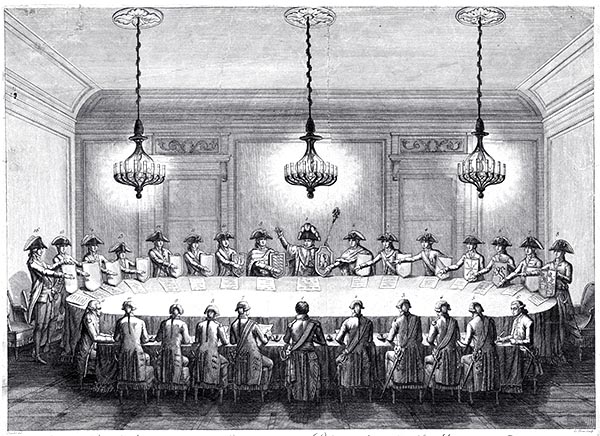
‘Confédération des États du Rhin, le 25 juillet 1806’
Pierre Adrien Le Beau, Naudet, Jean - 1806
The Rijksmuseum
The Papal States were part of the French Empire; the Tiber was a department of France. In the streets of Paris one saw cardinals, semi- captive, who, sticking their heads out of the doors of their carriages, asked: ‘Does he live here, the King of...? – ‘No,’ the doorman would reply, ‘he’s further on.’ Austria only made amends by handing over its daughter: the rider from the south claimed Honoria from Valentinian with half the provinces of the Empire.
How were these miracles achieved? What qualities did the man possess who gave birth to them? I am going to follow the course of Bonaparte’s great career, which nevertheless passed so swiftly that his age occupies a brief part of the years covered by these Memoirs. The fastidious reproduction of genealogies, the cold examination of facts, and the insipid verification of dates are duties to which the writer is constrained.
Book XIX: Chapter 2: Bonaparte – His Family
BkXIX:Chap2:Sec1
The first Buonaparte (Bonaparte) of whom there is mention in recent annals is Jacopo Buonaparte, who, as augur of future conquest, left us his history of the Sack of Rome in 1527, of which he was an eye-witness. Napoléon-Louis Bonaparte, son of the Duchesse de Saint-Leu, who died after the insurrection in the Romagna, translated this curious document into French; at the head of the translation he has placed a genealogy of Buonaparte: the translator says ‘that he will content himself with filling in the gaps in the preface written by the Cologne editor, by publishing authentic details of the Bonaparte family; scraps of history,’ he says, ‘which have been almost entirely forgotten, but interesting at least to those who like to discover, in the annals of time past, the origin of a more recent example.’
There follows a genealogy in which one finds a Chevalier Nordille Buonaparte, who, on the 2nd of April 1226, stood surety for Prince Conradin of Suabia (he whose head the Duke of Anjou severed) for the value of the customs rights of the said Prince’s effects. Around 1255 the proscription of Trevisan families began: a Bonaparte branch established itself in Tuscany, where one meets with them in the high offices of State. Louis-Marie-Fortuné Buonaparte, of the branch established at Sarzana, crossed to Corsica in 1612, settled in Ajaccio and became head of the Corsican branch of the Bonapartes. The Bonapartes carry arms of gules two bends sinister between two stars or.
There is another genealogy that Monsieur Panckoucke has placed at the head of a collection of Bonaparte’s writings; it differs in several details from that given by Napoléon-Louis. Madame d’Abrantès, on her side, thinks that Bonaparte might be a Comnène, alleging that the name Bonaparte is a literal translation of the Greek Caloméros, the surname of the Comnène. Napoleon-Louis feels he must end his genealogy with these words: ‘I have omitted many details, since these titles of nobility are only an object of curiosity for a small number of people, and besides the Bonaparte family acquires no lustre from them.’
‘He who serves his country well needs no ancestors.’
Despite this philosophical line of verse, the genealogy exists. Napoléon-Louis wished to make the concession to his century of a democratic apophthegm without eliciting its consequence.
All this is curious: Jacopo Buonaparte, historian of the Sack of Rome, and the detention of Pope Clement VII by the soldiers of the Constable de Bourbon, is of the same blood as Napoleon Bonaparte, destroyer of so many towns, master of Rome become a prefecture, King of Italy, conqueror of the Bourbon crown and gaoler of Pius VII, after having been consecrated Emperor of the French by the Pontiff’s own hand. The translator of the work of Jacopo Buonaparte is Napoléon-Louis Buonaparte, nephew of Napoleon and son of the King of Holland, brother of Napoleon; and this young man chances to die during the late insurrection in the Romagna, some distance from the two towns where the mother and widow of Napoleon are exiled, at the moment when the Bourbons tumble from their throne for the third time.
As it would have been quite difficult to make Napoleon the son of Jupiter Ammon by the serpent beloved of Olympias, or a descendant of the grandson of Venus by Anchises, liberated scholars (such as Las Cases) found a different marvel to employ: they demonstrated to the Emperor that he was descended in direct line from the Iron Mask. The Governor of the Îles Sainte-Marguerite was called Bonpart; he had a daughter; the Iron Mask, twin brother of Louis XIV, fell in love with the daughter of his gaoler and secretly married her, by the Court’s own admission. The children born of this union were taken clandestinely to Corsica, bearing their mother’s name; the Bonparts transformed themselves into Bonapartes due to the change of language. So the Iron Mask became a mysterious brazen-faced ancestor of the great man, connected in this way to the great king.
The Franchini-Bonaparte branch of the family carried three golden fleurs-de-lis on its shield. Napoleon smiled at this genealogy with an expression of incredulity; but he did smile: it was ever a claim of royalty of benefit to his family. Napoleon affected an indifference he did not feel, since he himself had called for his genealogy from Tuscany (Bourienne). Precisely because Bonaparte’s birth lacks any connection with divinity, that birth is wonderful: ‘I saw,’ says Demosthenes, ‘that Philip against whom we fought for the freedom of Greece and the salvation of its Republics, his eye cut out, his collarbone fractured, his hand and leg mutilated, offering up all his limbs to the blows of fate with unchangeable resolution, satisfied if he might live with honour, and crown himself with the palms of victory.’
Now, Philip was Alexander’s father; Alexander was then the son of a king and a king worthy of the title; because of those twin realities, he commanded obedience. Alexander, born to the throne, had not, as Bonaparte had, a lesser life to live, before achieving the greater one. Alexander offers no disparities in his career; his teacher is Aristotle; taming Bucephalus is one of his childhood pastimes. Napoleon has only an ordinary schoolteacher to instruct him; chargers are not available to him; he is the least wealthy of his college companions. This artillery sub-lieutenant, lacking servants, nevertheless obliged Europe to acknowledge him not long ago; this little corporal summoned the greatest sovereigns of Europe to his antechambers:
‘Are our two kings not yet here? Tell them then
They are over-late, that Attilla tires of them.’
Napoleon, who cried out so feelingly: ‘Oh, if only I were my grandson!’ did not inherit family power, he created it: what diverse abilities does not this creation suppose! Would you have Napoleon be merely the wielder of an intellect that unusual events, and extraordinary danger, have developed? That supposition would make him no less astonishing: indeed, what would a man be who was capable of directing and appropriating so many unusual superiorities?
Book XIX: Chapter 3: The Corsican branch of the Bonapartes specifically
BkXIX:Chap3:Sec1
However, if Napoleon was no prince, he was, as the old expression has it, the son of a family. Monsieur de Marbeuf, Governor of the Island of Corsica, obtained Napoleon’s admission to a school in Autun; he was later enrolled in the college at Brienne. Élisa, Madame Bacciochi, received her education at Saint-Cyr: Bonaparte reclaimed his sister when the Revolution closed the doors on those religious retreats. Thus one finds a sister of Napoleon as one of the last pupils of an institution where Louis XIV heard its first young ladies chanting the choruses of Racine.
The proofs of nobility required for Napoleon’s admission to a military school were prepared: they contained the baptismal certificate of Carlo Bonaparte, Napoleon’s father, from which Carlo one can go back to Francesco, ten generations earlier; a certificate from the principal nobles of the town of Ajaccio, proving that the Bonaparte family had always been numbered among the oldest and noblest; a certificate of recognition that the Bonaparte family of Tuscany enjoyed patrician rank, and declaring that its origin was one with that of the Bonaparte family of Corsica, etc, etc.
‘On Bonaparte’s entering Treviso,’ says Monsieur Las Cases, ‘they told him that his family had been powerful there; at Bologna, that they had been inscribed in the golden book. At their meeting in Dresden, the Emperor Francis told the Emperor Napoleon that his family had been monarchs in Treviso, and that he had been shown the documents regarding the matter: he added that to have been a monarch was beyond price, and that he must tell Marie-Louise, to whom it would bring great pleasure.’
Born of a race of gentlemen, which forged alliances with the Orsini, the Lomelli, and the Medici, not for a moment was Napoleon, who had been attacked by the revolution, a democrat; that is clear from all he said and wrote: ruled by his blood his leanings were towards aristocracy. Pasquale Paoli was not Napoleon’s godfather as he claimed: it was the obscure Laurent Giubega de Calvi; one learns this particular from the registry entry for the baptism, carried out at Ajaccio by the cathedral bursar, the priest Diamante.
I am afraid of compromising Napoleon in setting him among the ranks of the aristocracy. Cromwell, in his speech to Parliament on the 12th of September 1654, declared he was born a gentleman; Mirabeau, La Fayette, Desaix and a hundred other partisans of the Revolution were also noblemen. The English have claimed that Emperor’s first name was Nicholas, from which in derision they call him Nick. That fine name Napoleon came to him from one of his uncles who married his daughter to an Ornano. Saint Napoleon was a Greek martyr. According to the commentators on Dante, Count Orso was the son of Napoleone da Cerbaia. No one in the past, in reading history, was struck by that name which several Cardinals bore; now it seems striking. A man’s fame does not flow backwards; it flows onwards. The Nile at its source is only known to some Ethiopian; at its mouth, what nation does not know of it?
Book XIX: Chapter 4: Bonaparte’s birth and childhood
BkXIX:Chap4:Sec1
It remains attested that Bonaparte’s real name was Buonaparte; he signed his name in that way himself throughout his Italian campaign, and until he was thirty-three. He then Frenchified it, and only signed as Bonaparte: I will leave him with that name which he gave himself and which he has engraved at the foot of his indestructible statue. (That name, Buonaparte, was sometimes written without the u: the bursar of Ajaccio cathedral who signed the register at Napoleon’s baptism wrote Bonaparte three times without using the Italian vowel u.)
Did Bonaparte take a year from his age in order to declare himself French, that is to say, in order for his birth to have taken place after the date of the union of Corsica with France? That question is treated in a brief but thorough and substantial manner by Monsieur Eckard: one can read his pamphlet. The result of it is that Bonaparte was born on the 5th of February 1768 and not the 15th of August 1769, despite Monsieur Bourienne’s positive assertion. That is why the Senate official, in his proclamation of the 3rd of April 1814, treats Napoleon as a foreigner.
The act celebrating the marriage of Bonaparte with Marie-Josèphe-Rose de Tascher, inscribed in the civic register of the second arrondissement of Paris, on the 19th Ventôse Year IV (9th March 1796), attests that Napoléon Buonaparte was born at Ajaccio on the 5th of February 1768, and that his birth certificate, stamped by the civic official, certifies as to the date. That same date accords exactly with what the marriage certificate affirms; that the bridegroom was 28 years old.
Napoleon’s birth certificate, presented at the town hall of the second arrondissement on the celebration of his marriage to Josephine, was removed by one of the Emperor’s aides-de-camp at the start of 1810, when proceedings were in hand to annul Napoleon’s marriage to Josephine. Monsieur Duclos, not daring to refuse an Imperial order, wrote at the time on one of the sheets of Napoleon’s dossier: ‘His birth certificate has been sent to him, on my being unable, at the moment of his request, to deliver a copy to him.’ The date of Josephine’s birth is altered on the marriage certificate, scratched out then overwritten, though one can make out the lines of the original with a magnifying glass. The Empress shed four years: the pleasantries offered on this subject at the Tuileries and at St Helena are mean and spiteful.
Bonaparte’s birth certificate, removed by the aide-de-camp in 1810, has vanished; all attempts to find it have proved unfruitful.
These are the irrefutable facts, and I too think, based on these facts, that Napoleon was born at Ajaccio on the 5th of February 1768. However I do not delude myself as to the historical difficulties which appear if that date is adopted.
Joseph, Bonaparte’s elder brother, was born on the 5th of January 1768; his younger brother, Napoleon, could not have been born in the same year, unless the date of Joseph’s birth was similarly adjusted: that is possible, since all the official certificates of Napoleon and Josephine are suspected of being flawed. Notwithstanding a valid suspicion of fraud, the Comte de Beaumont, sub-prefect of Calvi, in his Observations on Corsica, attests that the civic register of Ajaccio notes Napoleon’s birth as the 15th of August 1769. Finally, documents Monsieur Libri has lent me demonstrate that Bonaparte himself considered he had been born on the 15th of August 1769, at a time when he could have had no reason to wish himself younger. But the official date on the marriage papers from his first marriage and the suppression of his birth certificate remain.
Be that as it may, Bonaparte would stand to gain nothing from this alteration to his life-story: if you fix his birth on the 15th of August 1769, you are forced to place his conception around the 15th of November 1768; now, Corsica only yielded to France after the treaty of the 15th of May 1768; and the last submissions of the pieves (the cantons of Corsica) were only effected on the 14th of June 1769. According to the most generous calculations, Napoleon would not be French until some hours of darkness had passed in his mother’s womb. Well, if he was the citizen of a somewhat doubtful country, it sets his nature apart: a being descended from above, worthy of belonging to all times and all countries.
However, Bonaparte did have leanings towards Italy; he detested the French until the time when their bravery granted him an empire. The evidence of this aversion is everywhere in his youthful writings. In a note which Napoleon wrote on suicide, one finds this passage: ‘My compatriots, loaded with chains, tremble as they shake the hand which oppresses them. Frenchmen, not content with having stolen everything we cherish, you have even corrupted our morals.’
A letter written to Paoli in England, in 1789, which has been made public, begins like this:
‘General,
I was born as our country was lost. Thirty thousand Frenchmen spewed onto our shores, drowning the throne of liberty in waves of blood: such was the odious sight that first struck my eyes.’
Another letter from Napoleon to Monsieur Gubica, chief clerk to the State of Corsica, reads:
‘While France is reborn, what will become of the rest of us, Corsican wretches? Forever base, will we continue to kiss the insolent hand that oppresses us? Will we continue to see all the roles, that natural right destined us for, occupied by foreigners as despicable in their morals and their conduct as their birth is abject?’
Finally the rough draft of a third letter of Bonaparte’s, in manuscript form, regarding the recognition by Corsica of the National Assembly of 1789, begins thus:
‘Gentlemen,
It was by bloodshed that the French became our rulers; it was by bloodshed that they secured their conquest. The soldier, the lawyer, the banker, united to oppress us, despise us, and force us to swallow deep draughts from the cup of ignominy. We have suffered their vexation long enough; but since we have lacked the courage to free ourselves from them, let us ignore them forever; let them be treated again with the contempt they deserve, or at least let them aspire to other nations’ trust in their country; it is certain that will never obtain it from ours.’
Napoleon’s prejudices against his mother-land never vanished entirely: once crowned, he appeared to neglect us; he only spoke of himself, his empire, his soldiers, hardly ever of the French; this phrase escaped his lips: ‘You, the French.’
The Emperor, in his papers from St Helena, tells how his mother, surprised by the birth-pangs, had let him fall from the womb onto a carpet patterned with large leaves, depicting the heroes of the Iliad: he would not have been any the less who he was if he had fallen onto straw.
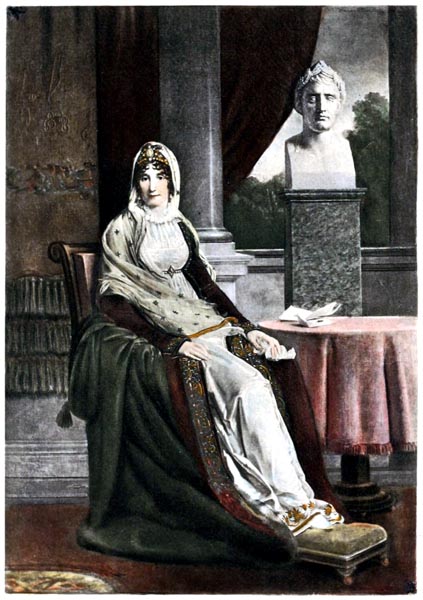
‘Marie-Letitia Ramolino Bonaparte’
Napoleon's Court and Cabinet of St. Cloud : in a Series of Letters - Gentleman at Paris (p186, 1899)
Internet Archive Book Images
I have spoken of the documents which have been discovered; when I was Ambassador in Rome in 1828, Cardinal Fesch, while showing me his pictures and books, told me he possessed manuscripts belonging to the young Napoleon; he attached so little importance to them that he proposed to show me them; I left Rome, and lacked the opportunity to consult these documents. After the death of Madame Mère and Cardinal Fesch, various items belonging to the estate were dispersed; the box containing Napoleon’s Essais was taken to Lyons with several others; it fell into the hands of Monsieur Libri. Monsieur Libri inserted an article itemising Cardinal Fesch’s papers in the Revue des Deux Mondes of the 1st of March that year, 1842; he has since kindly chosen to send me the box. I have profited from the communication by adding to the previous text of my Memoirs concerning Napoleon all the reservations derived from more ample information, from contradictory statements, and from various objections arising.
Book XIX: Chapter 5: Bonaparte’s Corsica
BkXIX:Chap5:Sec1
Benson, in his Sketches of Corsica, speaks of the country house which Bonaparte’s family occupied:
‘Going along the sea-shore from Ajaccio towards the Isle Sanguiniere, about a mile from the town, occur two stone pillars, the remains of a doorway, leading up to a dilapidated villa, once the residence of Madame Bonaparte’s half-brother on the mother’s side, whom Napoleon created Cardinal Fesch. The remains of a small summer-house are visible beneath the rock, the entrance to which is nearly closed by a luxuriant fig-tree. This was Bonaparte’s frequent retreat, when the vacations of the school at which he studied permitted him to visit home.’
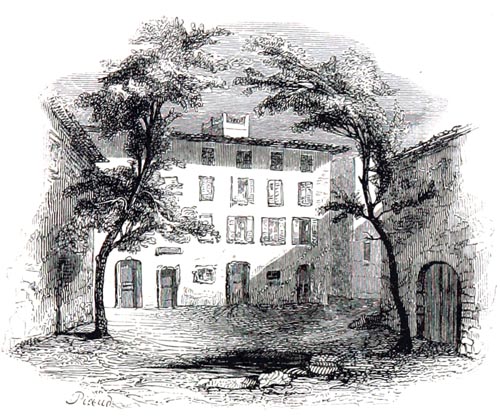
‘Maison des Bonaparte à Ajaccio’
Napoléon Ier et Son Temps - Roger Peyre (p47, 1888)
The British Library
Love of his native land accompanied Napoleon on his everyday walks. Bonaparte, in 1788, wrote, a propos of Monsieur de Sussy, that Corsica offers a perpetual springtime; he no longer spoke of his island when he was happy; he even had an antipathy towards it; it recalled too narrow a cradle. But at St Helena his homeland was recalled to memory: ‘Corsica held a thousand charms for Napoleon, it explained his finest traits, the bold vessel that was his physical make-up. Everything was better there, he would say; there was nothing like the smell of its soil even: that was enough for him to distinguish the place with his eyes closed; he had seen no part of it again. He saw himself there in his childhood, among his first loves; he found himself there in youth among a thousand precipices, travelling the high summits, the deep valleys.’
Napoleon found romance in his cradle; that romance began with Vannina, executed by her husband Sampietro. Baron Neuhof, that is King Theodore, had visited every shore, demanding help from England, the Pope, the Grand Turk, and the Bey of Tunis, after having been crowned King of the Corsicans, who did not know whom to give themselves to: Voltaire laughed at it all. The two Paoli, Giacinto and above all Pasquale, had filled Europe with the sound of their names. Buttafuoco begged Rousseau to act as legislator for Corsica; the philosopher from Geneva thought of establishing himself in the country of one who, in troubling the Alps, took Geneva under his wing. ‘There is still one country in Europe,’ wrote Rousseau, ‘capable of legislation: that is the island of Corsica. The courage and constancy with which this brave people has regained and defended its liberty well merits a wise man teaching them how to preserve it. I have a presentiment that one day that little island will astonish Europe.’
Brought up in Corsican society, Bonaparte was raised in that primary school for revolutionaries; he brings us on his debut neither the calm nor the feelings of youth, but a spirit already stamped with political passion. That alters the conception one has of Napoleon.
When a man becomes famous, antecedents are invented for him: predestined children, according to the biographers, are fiery, loud, and untameable; they learn everything, or nothing; more often than not they are also gloomy children, who do not take part in their companions’ games, who dream in solitude and are already haunted by the threat of fame. Behold how some enthusiast has dug up the exceedingly ordinary letters (Italian ones for sure) from Napoleon to his grand-parents; we are forced to swallow these puerile inanities. Prophecies of future characteristics are in vain; we are what circumstances make us; let a child be happy or sad, silent or noisy, let him show or not show an aptitude for work, no oracle has inspired him. Halt the development of a schoolboy at sixteen; let him be as intelligent as you choose to make him, that infant prodigy, frozen in adolescence, will remain an idiot; the child lacks even the loveliest of the graces, a smile: he laughs, and fails to smile.
Napoleon then was a little boy neither more or less distinguished than his peers: ‘I was merely,’ he declares, ‘an obstinate and curious child.’ He liked buttercups and ate cherries with Mademoiselle du Colombier. When he left home, he only knew Italian. His ignorance of the language of Turenne was almost total; like the German Marshal Saxe, Bonaparte, the Italian, could not spell a single word correctly; Henri IV, Louis XIV and Marshal Richelieu, less excusably, were hardly any better. It was obviously to conceal the deficiencies of his education that Napoleon rendered his signature indecipherable. Leaving Corsica at the age of nine, he did not see the island again until eight years later. At the college in Brienne, there was nothing extraordinary about him, either in his manner of studying, or in his appearance. His comrades made jokes about his name Napoleon and his country; he said to his friend Bourrienne: ‘I will do you Frenchmen all the harm I can.’ In a report to the king in 1784, Monsieur de Kéralio affirmed that the young Bonaparte would make an excellent sailor; the phrase is suspect, since his report was only discovered when Napoleon was inspecting the flotilla at Boulogne.
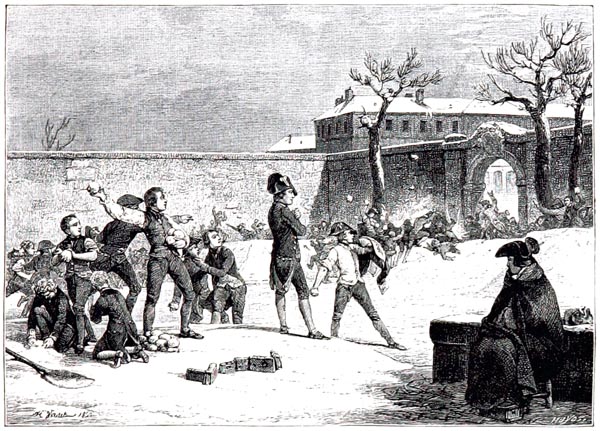
‘Enfance de Napoléon. Lithographie d'Horace Vernet’
Napoléon Ier et Son Temps - Roger Peyre (p33, 1888)
The British Library
Leaving Brienne on the 14th of October 1784, Bonaparte went to the École Militaire in Paris. The civil list paid his board and lodgings; he was distressed at receiving a grant. That payment to him was continued, witness this sample receipt found in Fesch’s box (Monsieur Libri’s box).
‘I the undersigned acknowledge receipt from Monsieur Biercourt of the sum of 200 provided from the grant which the king afforded me from the funds of the Military College in my position as a former cadet of the college in Paris.’
Mademoiselle de Comnène (Madame d’Abrantès), residing in turn, with her mother, at Montpellier, Toulouse and Paris, lost no opportunity of seeing her compatriot Bonaparte: ‘When I pass the Quai de Conti these days,’ she wrote, ‘I cannot prevent myself glancing at the upper room, on the left side of the house, on the third storey; that is where Napoleon stayed, each time he came to my parent’s home.’
Bonaparte was not liked at his new college: morose and rebellious, he failed to please his masters; he criticised everything indiscriminately. He addressed a note to the vice-principal on the shortcomings of the education he was receiving. ‘Would it not be better to force them (the students) to be self-sufficient, that is to say, instead of their fiddly cooking which they could do without, make them eat military rations or something approaching them, to accustom them to scavenge, brush their clothes, clean their boots and shoes?’ That is what he later demanded at Fontainebleau and Saint-Germain.
Having snubbed the college, he relieved it of his presence, being named as sub-lieutenant of artillery in the Regiment de La Fère.
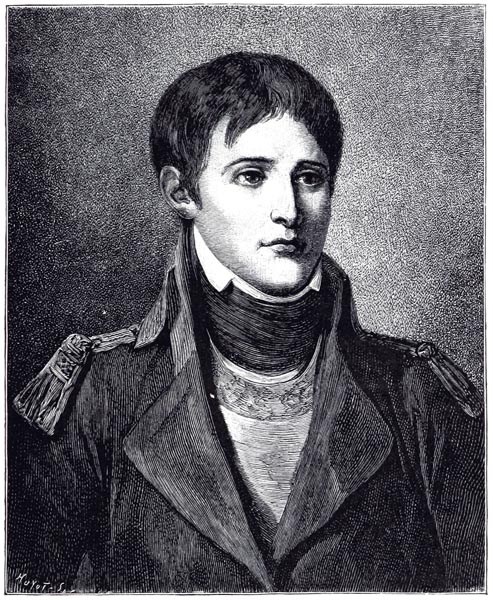
‘Bonaparte Lieutenant d'Artillerie. Peint par Greuze’
Napoléon et Son Temps - Roger Peyre (p33, 1896)
The British Library
BkXIX:Chap5:Sec2
Napoleon’s literary career extended from 1784 to 1793: a short space of time, but lengthy in terms of effort. Wandering, with the artillery corps to which he belonged, to Auxonne, Dôle, Seurres, and Lyons, Bonaparte was attracted to famous places like a bird drawn to a mirror or lured by a decoy. Alert to academic questions, he would respond to them; he addressed himself confidently to powerful people he did not know: he made himself the equal of everyone before becoming their master. Sometimes he would write under an assumed name; sometimes he would sign his own name which made no difference to his anonymity. He wrote to the Abbé Raynal, and to Monsieur Necker; he sent notes to the Ministry on the management of Corisca, on projects for the defence of Saint-Florent, Mortella Point, and the Gulf of Ajaccio, on the manner of placing canon when firing shells. He was listened to as little as Mirabeau was listened to when he drafted projects in Berlin regarding Prussia and Holland. He studied geography. It has been remarked that in speaking of St Helena he indicated it by these words alone: ‘A little island’. He was interested in China, the Indies, and the Arabs. He laboured over the historians, philosophers, economists, Herodotus, Strabo, Diodorus Siculus, Filangieri, Mably, Smith; he refuted the Discourse on the origin and fundamental principles of the equality of men and wrote: ‘I do not believe in it; I do not believe in it at all.’ Lucien Bonaparte relates that he, Lucien, had made two copies of a history that Napoleon had sketched out. Part of the manuscript original of the sketch was discovered in Cardinal Fesch’s box: his research is not very interesting, the style is commonplace, and the story of Vannina is re-told ineffectually. Sampietro’s words to the great nobles of Henri II’s court after his execution of Vannina are worth all Napoleon’s narrative: ‘What do the problems of Sampietro and his wife matter to the King of France!’
At the start of his career Bonaparte had not the slightest presentiment of his future; it was only when he attained rank that he had the idea of climbing higher: but if he did not aspire to raise himself, he had no wish to descend; one could not tear him from the place he had once reached. Three manuscript notebooks (Fesch’s box) are dedicated to research regarding the Sorbonne, and Gallican liberty; there is correspondence with Paoli, Salicetti, and especially with Père Dupuis, a Minim, Vice-principal of Brienne College, a man of religion and good sense who counselled his young pupil and called Napoleon his dear friend.
Bonaparte mixed imaginative pages among these thankless tasks; he spoke of women; he wrote Le Masque prophète, Le Roman corse, and an English novel, The Earl of Essex; he writes dialogues about love which he treats with scorn, and yet he addresses a passionate letter in draft to an unknown beloved; he takes little account of glory, placing love of country alone in the first rank, and that country was Corsica.
In Geneva, anyone can see a request he made of a bookseller: the romantic sub-lieutenant enquired about the Memoirs of Madame de Warens. Napoleon was also a poet, as were Caesar and Frederick: he preferred Ariosto’s works to Tasso’s; he found portraits of his future generals there, and a horse ready bridled for his journey to the stars. The following madrigal addressed to Madame Saint-Huberty playing the role of Dido, is attributed to Bonaparte; the content may have been the Emperor’s, the form is from a more skilful hand than his:
‘Romans, who pride yourself on your fair origin,
See what your Empire’s birth depended on!
Dido has no attraction half as strong
With which to stop her lover taking wing.
But if that other Dido, who graced this haven,
Had been true queen of Carthage,
He, to serve her, his gods would have forsaken,
And left your land fit only for the savage.’
Around this time Bonaparte seems to have been tempted towards suicide. A thousand fledglings are obsessed with the idea of suicide, which they consider proof of their superiority. This manuscript note appears among those papers sent on by Monsieur Libri: ‘Always alone among a crowd of men, I return home to dream by myself, and deliver myself to all the power of melancholy. In which direction does it wander today? Towards death. If I was sixty, I would respect the prejudices of my contemporaries, and I would wait patiently for nature to take her course; but since I begin to feel distress, so that nothing delights me, why should I endure these days where nothing goes well for me?’
These are the reveries of all Romantics. The beginning and end of such ideas is found in Rousseau, whose text Bonaparte will alter with several phrases of his own.
Here is an essay of another kind; I reproduce it letter for letter: education and blood ought not to make princes too disdainful of it: let them recall their eagerness to wait in line for a man who has chased them at will from the ante-chambers of kings.
‘Phrases, Certificats and Other Essencial Things Relative to my Current Position.
Manner of requesting leave.
When one is in mid-semester and wants to obtain summer leave because of illness, there is a certificate to be drawn up by a doctor in town and a surgeon, that before the period you designate, your illness does not allow you to rejoin the garrison. You will observe that this certificate is to be on stamped paper, it must be stamped by the judge and commandant of the place.
Then you will draw up your memoir to the Minister of War in the manner and phrases as follows:
Ajaccio, the 21st April 1787.
‘MEMOIR REQUESTING LEAVE.
ROYAL CORPS of artillery
Monsieur Napoleon de Buonaparte, second-lieutenant, Regiment, La Fère, artillery.
REGIMENT La Fère
Request, of Monseigneur le maréchal de Ségur, to be so kind as to grant him leave for five and a half months from the 16th of May next which he requires to restore his health in accord with the certificate of the doctor and surgeon enclosed. In view of my limited means and the cost of treatment, I ask that paid leave may be granted me.
Buonaparte’
Send all this to the colonel of the regiment, Monsieur de Lance whom one can write to care of Monsieur Sauquier, Military Paymaster-General at Court, addressed to the Minister or the Paymaster-General.’
What a detailed way of teaching oneself how to make mistakes! One visualises the Emperor labouring to legitimise the seizure of kingdoms, his office cluttered with illegal paperwork.
The young Napoleon’s style is declamatory; the only thing worthy of note is the energy of a pioneer shifting sand. The sight of these precious works recalls my juvenile hotchpotch, my Essais historiques, my manuscript of Les Natchez, four thousand pages in folio, fastened together with string; but I did not draw the little houses, childish sketches, and schoolboy scribbles, in the margin, that one sees in the margins of Bonaparte’s rough papers; among my juvenilities there was no stone ball that may have served as the model for a prototype cannonball.
Such then is my introduction to the Emperor’s life; the concept of Bonaparte arrived in the world before he did himself: it troubled the earth, secretly; in 1789, one felt, at the moment when Bonaparte appeared, something formidable, a disquiet one could not account for. When the globe is threatened by some catastrophe, one is warned of it by underlying disturbances; one is afraid; one lies awake listening during the night; one gazes at the sky without knowing why one does so, or what may happen.
Book XIX: Chapter 6: Paoli
BkXIX:Chap6:Sec1
Paoli was recalled from England by a proposal of Mirabeau’s, in 1789. He was presented to Louis XVI by the Marquis de La Fayette, and appointed as lieutenant-general and military commander of Corsica. Did Bonaparte support the exile whose protégé he had been, and with whom he corresponded? One presumes so. He did not delay in involving himself with Paoli: the crimes perpetrated in our first wave of troubles dampened the old general’s ardour; he handed Corsica to the English, in order to escape the Convention. Bonaparte joined a Jacobin club in Ajaccio; a hostile club was formed, and Napoleon was obliged to flee. Madame Letizia and her daughters took refuge in a Greek colony at Carghese, from where she gained Marseille. Joseph was married there, on the 1st of August 1794, to Mademoiselle Clary, the daughter of a rich merchant. In 1791, the Minister of War relieved Napoleon of his duties for a while, on his return to Corsica.
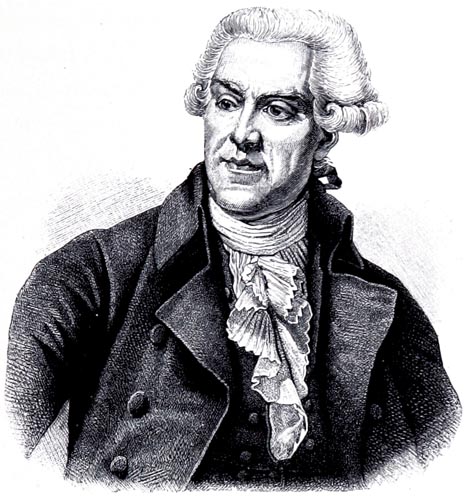
‘Le Général Pascal Paoli. D'Après un Document du Temps’
Napoléon Ier et Son Temps - Roger Peyre (p25, 1888)
The British Library
We find Bonaparte in Paris again, with Bourrienne, in 1792. Lacking financial resources, he became a speculator: he proposed to rent out houses being constructed in the Rue Montholon, with the design of sub-letting them. During this period the Revolution was in train; the 20th of June rang out. Bonaparte leaving, with Bourrienne, a restaurant on the Rue Saint-Honoré, near the Palais-Royal, saw five or six thousand ragged individuals shouting as they marched towards the Tuileries; he said to Bourrienne: ‘Let’s follow those beggars’; and he went off to take up position on the riverside terrace. When the king, whose residence had been invaded, appeared at one of the windows, decked out with a red cap, Bonaparte cried indignantly: ‘Che coglione! Why have they let that scoundrel in? They should have swept four or five hundred away with cannon fire, and the rest would be running yet.’
You know that on the 20th of June 1792, I was not far from Napoleon: I was walking at Montmorency, where Barère and Maret were seeking solitude, as I was, but for a different reason. Is that the period when Bonaparte was obliged to sell and negotiate little assignats called Corcets? After the death of a wine-seller from the Rue Saint-Avoy, in an inventory drawn up by Dumay, a solicitor, and Chariot, an auctioneer, Bonaparte appears to the tune of a fifteen franc debt for rent, which he could not pay: this poverty increases his greatness. Napoleon said, on St Helena: ‘At the sound of the assault on the Tuileries, on the 10th of August, I ran to the Carrousel, to the house of Fauvelet, Bourrienne’s brother, who kept a furniture shop.’ Bourienne’s brother had a speculation going which he called a national auction; Bonaparte had pledged his watch to it; a dangerous precedent: how many poor students consider themselves Napoleons because they have pawned their watch!
Book XIX: Chapter 7: Two pamphlets
BkXIX:Chap7:Sec1
Bonaparte returned to the south of France on ‘the 2nd of January Year II’; he found himself there just before the siege of Toulon; he wrote two pamphlets there: the first is in letter-form to Matteo Buttafuoco; he treats him with indignation and at the same time condemns Paoli for having given power back into the hands of the people: ‘A strange mistake,’ he cries, ‘that subjects the only man who by his education, the illustriousness of his birth, and his wealth, is fit to be governor, to a brute, a mercenary!’
Though a revolutionary, Bonaparte everywhere reveals himself as an enemy of the people; he was nevertheless complimented on his pamphlet by Masseria, the President of the Patrotic Club of Ajaccio.
On the 29th of July 1793, he had another pamphlet printed, Le Souper de Beaucaire. Bourrienne reproduces a manuscript reviewed by Bonaparte, but abridged and modified to be more in accord with the Emperor’s opinions at the time when he read the work again: it is a dialogue between a man from Marseilles, one from Nîmes, an army officer, and a Montpellier manufacturer. It is about a current affair of the time, the attack on Avignon by Carteaux’s army, in which Napoleon was involved as an artillery officer. He announces to the Marseillais that his party will be defeated, since it has ceased to hold fast to the Revolution. The Marseillais says to the officer, that is to say, to Bonaparte: ‘One always remembers that monster who was nevertheless one of the leaders of the club; he hung a citizen from a lantern, pillaged his house and violated his wife, having made her drink a glass of her husband’s blood.’ – ‘How terrible,’ the officer cries; ‘but is this story true! I doubt it, since no one believes in rape these days.’ It is the frivolousness of last century coming to fruition in Bonaparte’s icy temperament. That accusation of having drunk blood or forced it to be drunk has often been repeated. When the Duc de Montmorency was beheaded at Toulouse, armed men drank his blood in order to acquire the virtue of a great heart.
Book XIX: Chapter 8: A Captain’s brevet
BkXIX:Chap8:Sec1
We arrive at the siege of Toulon: here begins Bonaparte’s military career. Given Napoleon’s rank in the artillery at that time, Cardinal Fesch’s box contains a curious document: it is an artillery captain’s brevet granted to Napoleon by Louis XVI on the 30th of August 1792, twenty days after the actual dethronement, which took place on the 10th of August. The king had been incarcerated in the Temple on the 13th, two days after the massacre of the Swiss Guard. In this brevet it is stated that the nomination on the 30th of August 1792 will count as if the officer had been promoted on the preceding 16th of February.
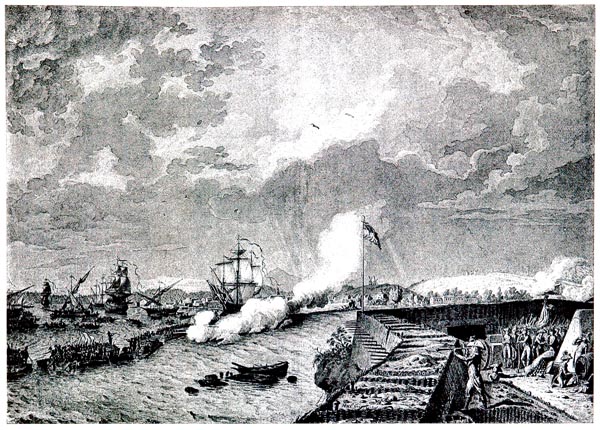
‘Siège de Toulon, d'Aprés un Dessin au Lavis de la Collection Hennin’
Napoléon Ier et Son Temps - Roger Peyre (p59, 1888)
The British Library
The ill-fated are often prophets; but this time the martyr’s prevision was not without reason as regards Napoleon’s future glory. In the War Office records there still exist various blank brevets, signed by Louis XVI in advance; they only await the filling-in of the empty spaces; the hastily granted commission will have come from this pile. Louis XVI, imprisoned in the Temple, on the eve of his trial, in the midst of his captive family, had other things to worry about than the promotion of some unknown.
The timing of the brevet is fixed by the counter-signature; this counter-signature is: Servan. Servan, appointed to the Ministry of War on the 8th of May 1792, was dismissed on the 13th of June of the same year; Dumouriez held the portfolio until the 18th; Lajard occupied the Ministry in turn until the 23rd of July; D’Abancourt succeeded him until the 10th of August, at which the National Assembly recalled Servan, who gave in his resignation on the 3rd of October. Our Ministers were as hard to count in those days as our victories were later.
Napoleon’s brevet cannot be dated to Servan’s first ministry, since the document carries the date of 30th of August 1792; it must be from his second ministry; however there is a letter of Lajard’s, from the 12th of July, addressed to Artillery Captain Bonaparte. Explain that if you can. Did Bonaparte acquire the document in question due to a corrupt official, the disorder at the time, or Revolutionary brotherhood? What patron furthered this Corsican’s affairs? That patron was the Eternal Lord; France, under divine compulsion, herself delivered the brevet to the first captain of earthly things; that brevet was authorised with the signature of Louis, who lost his head on condition that it would be replaced by that of Napoleon: the work of Providence before whom one can only raise one’s hands to heaven.
Book XIX: Chapter 9: Toulon
BkXIX:Chap9:Sec1
Toulon had recognised Louis XVII and opened its harbours to the English fleet. Carteaux on one flank, and General Lapoype on the other, approached Toulon on the orders of Representatives Fréron, Barras, Ricord and Saliceti. Napoleon, who had chanced to serve under Carteaux at Avignon, called to a military council, maintained that it was essential to seize Fort Mulgrave, constructed by the English on Caire hill, and to set up batteries on the two promontories of L’Éguillette and Balaguier which, firing on the larger and smaller harbour, would compel the enemy to abandon them. All turned out as Napoleon had predicted: a first view was to be had of his destiny.
Madame Bourrienne has added a few notes to her husband’s Memoirs; I will cite a passage from them which shows Bonaparte before Toulon:
‘I remarked,’ she says, ‘that at this time (1795, in Paris), his manner was cold and often sombre; his smile was hypocritical and often misplaced; and, regarding that comment, I recall that at that time, a few days after our return, he had one of those moments of savage hilarity which upset me, and which disposed me to dislike him. He was telling us, with an exalted gaiety, that being before Toulon, where he controlled the artillery, one of the officers who happened to be under his command was visited by his wife, to whom he had not long been married, and whom he tenderly loved. A few days afterwards, Bonaparte ordered another attack on the town, in which this officer was to be engaged. His wife came to General Bonaparte, and with tears entreated him to dispense with her husband's services that day. The General was inexorable, as he himself told us with a sort of savage and exalted gaiety. The moment for the attack arrived, and this officer, though he had always shown himself to be a very brave man, as Bonaparte himself assured us, felt a presentiment of his approaching death; he turned pale, he trembled. He was stationed beside the General, and during an interval when the firing from the town was very heavy, Bonaparte called out to him, ‘Take care! There is a shell coming!’ The officer, he added, instead of moving to one side, stooped down, and was literally cut in two. Bonaparte laughed loudly while describing in detail the parts of him which were blown away.’
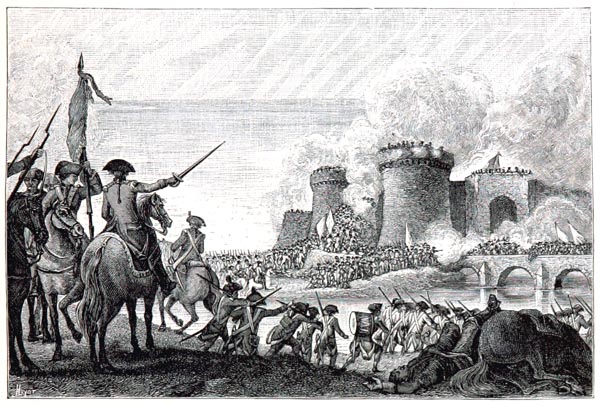
‘Reprise de la Ville de Toulon par les Armées de la République. Gravure de la Collection Hennin’
Napoléon Ier et Son Temps - Roger Peyre (p61, 1888)
The British Library
Toulon re-taken, the scaffolds were erected; eight hundred victims were brought to the Champs de Mars; they were gunned down. The commissioners advanced, shouting: ‘Those who are not dead stand up; the Republic shows them mercy’, and those wounded who rose to their feet were then massacred. The scene was so fine that it was presented on stage at Lyons after the siege.
‘What think you? Perhaps some guilty one
has yet escaped the first sharp lightning bolt:
Announce a pardon, and if, fooled by hope,
some quivering wretch rises once again,
let the flames redouble, let the fire reclaim.’
(Abbé DELILLE.)
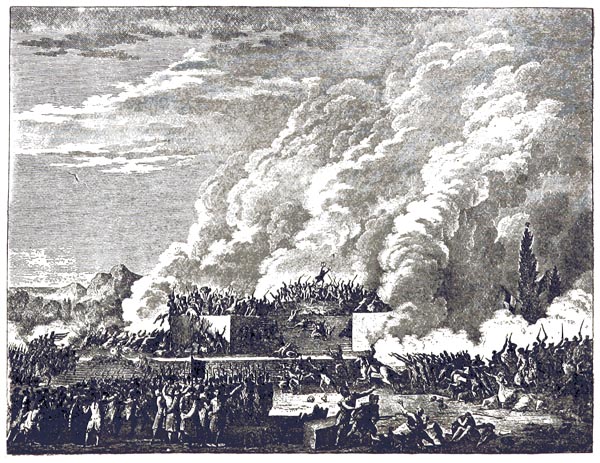
‘Massacre of the Champ de Mars, July 1791’
The History of the French Revolution, 1789 to 1795; or a Country Without a God - Henry H. Northrop (p250, 1890)
The British Library
Did Bonaparte order the executions in person in his role as artillery commander? A feeling of humanity would not have stopped him, though he was not cruel by nature.
This note to the commissioners of the Convention is extant:
‘Citizen Representatives, from the field of glory, treading in the blood of traitors, I announce to you with joy that your orders have been executed and France is avenged: neither their age nor sex has saved them. Those who were only wounded by the Republican cannon have been dispatched by the sword of liberty and the bayonet of quality. Greetings and respects,
BRUTUS BUONAPARTE, citizen sans-culotte.’
This letter was printed for the first time, I think, in La Semaine, the news sheet published by Malte-Brun. The Vicomtesse de Fars (pseudonym) gives it in her Memoirs on the French Revolution; she adds that the note was written on the casing of a drum; Fabry reprints it, in an article on Bonaparte, in Biographies of Living Men; Royou, in his History of France, declares that no one knows which mouth uttered the fatal command; Fabry, already cited, says, in Les Missionnaires de 93, that some attribute the order to Fréron, others to Bonaparte. The executions on the Champ de Mars in Toulon are described by Fréron in a letter to Moïse Bayle of the Convention, and by Moltedo and Barras to the Committee of Public Safety. Who in fact was responsible for the first bulletin of Napoleon’s victories? Was it Napoleon or his brother? Lucien, abhorring his mistakes, confesses, in his Memoirs, that he had at first been an ardent Republican. Appointed as head of the Revolutionary Committee at Saint-Maximin in Provence, ‘we sent no end of words and speeches,’ he says, ‘to the Jacobins in Paris. As it was the fashion to employ classical names, my former monk adopted, I believe, that of Epaminondas, and I that of Brutus. A pamphlet has attributed this borrowing of Brutus’ name to Napoleon, but it belonged to me alone. Napoleon sought to elevate his own name above those of ancient history, and if he had wanted to take part in these masquerades, I do not think he would have chosen that of Brutus.’
There is courage in this confession. Bonaparte, in the Memorial of St Helena, maintains a profound silence regarding this part of his life. That silence, according to Madame La Duchesse d’Abrantès, is explained by something improper in his situation: ‘Bonaparte was more visible,’ she says, ‘than Lucien, and though he has since often sought to substitute Lucien for himself, at that time there could be no mistake about it. “The Memorial of St Helena,” he must have thought, “will be read by a hundred million people, among whom one might count perhaps scarcely a thousand who know the facts that trouble me. Those thousand individuals will preserve the memory of those facts, in a manner unlikely to disturb anyone, by oral tradition: the Memorial will thus become irrefutable.”’.
So, serious doubts remain concerning the note which Lucien or Napoleon signed: how could Lucien, not being a representative of the Convention, arrogate to himself the right to give a report of the massacre? Was he deputed by the commune of Saint-Maximin to take part in the carnage? And why would he have taken upon himself the responsibility of recording it, when there were those greater than him at play in the amphitheatre, and witnesses to the execution carried out by his brother? It costs something to lower one’s gaze so far having raised it so high.
Let us concede that the narrator of Napoleon’s exploits was Lucien, President of the Committee of Saint-Maximin: it will remain eternally true that one of Bonaparte’s first bursts of cannon fire was fired against the French; it is at least certain that Napoleon was further called on to shed their blood on the 13th Vendémiaire; he again reddened his hands on the death of the Duc d’Enghien. On the first occasion, those immolations ought to have revealed Bonaparte; the second hecatomb carried him to the rank which made him master of Italy; and the third eased his entry into empire.
He has grown greater on our flesh; he has split open our bones, and fed himself on the marrow of lions. It is a deplorable thing, but it needs to be recognised, if one does not wish to be ignorant of the mysteries of human nature and the character of the age: a part of Napoleon’s power came from being drenched by the Terror. The Revolution is content to serve those who have traversed its crimes; an origin in innocence is an obstacle.
The younger Robespierre was seized with affection for Bonaparte and wanted to summon him to command Paris in place of Hanriot. Napoleon’s family were established in the Chateau de Sallé, near Antibes. ‘I went there from Saint-Maximin’ says Lucien, ‘to spend a few days with my family and my brother. We were all together again, and the General gave us all the time he could. He came there one day, more preoccupied than usual and, walking between Joseph and myself, announced that it was up to him whether he left for Paris next day, with a view to establishing us all there to our advantage. Speaking for myself this news delighted me: to reach the capital at last seemed to me a piece of good news nothing could offset. “They are offering me, Hanriot’s place,” Napoleon told us. “I must give my reply tonight. Well! What do you say to it?” We hesitated a moment. “Oh!” the General resumed, “It’s well worth the trouble of thinking about: it’s nothing to be enthusiastic about; it is not as easy to save one’s head in Paris as at Saint-Maximin. – Young Robespierre is honest, but his brother is no joke. I would have to serve him. – Me: support that man! No, never! I know how useful I would be to him in replacing his imbecile of a commander in Paris; but it is not what I want to do. It is not my time yet. Today there is no place of honour for me in the army: be patient, I will command Paris later.” Such were Napoleon’s words. Then he expressed to us his indignation at the Reign of Terror, whose imminent end he announced to us, and finished by repeating several times, half serious and half smilingly: “What would I do in that galley?”’
BkXIX:Chap9:Sec2
After the siege of Toulon, Bonaparte found himself involved in the manoeuvres of our Army of the Alps. He received an order to go to Genoa: secret instructions commanded him to reconnoitre the state of the fortress at Savona, and to gather information on the intentions of the Genoese government regarding the coalition. These instructions, delivered at Loano on the 23rd Messidor Year II of the Republic, are signed Ricord.
Bonaparte fulfilled his mission. The 9th Thermidor arrived: the terrorist deputies were replaced by Albitte, Saliceti and Laporte. Suddenly they announced, in the name of the French people, that General Bonaparte, commanding the artillery of the Army of Italy, had totally lost their confidence due to the most suspicious conduct, above all by the journey he had lately made to Genoa.
The warrant from Barcelonnette, dated 19th Thermidor Year II of the French Republic, one, indivisible, and democratic (6th of August, 1794), reads: ‘that Bonaparte shall be placed under arrest and conveyed to the Committee of Public Safety in Paris, under strong and secure guard’. Saliceti examined Bonaparte’s papers; he replied to those who interested themselves in the detainee that it was necessary to act with rigour after an accusation of espionage by Nice and Corsica. That accusation was in consequence of secret instructions issued by Ricord: it was easy to insinuate that, instead of serving France, Napoleon had served the enemy. The Emperor made great use of espionage accusations; he should have remembered the dangers which equivalent accusations had exposed him to himself.
Napoleon, struggling, said to the representatives: ‘Saliceti, you know me. Albitte, you do not know me at all; but you do know with what cunning slander can hiss. Listen to me; restore the patriots’ esteem; one hour afterwards, if the wretches wish my life...I value it so little! I have risked it so often!’
A decision to acquit him followed. Among the documents which at that time served to confirm Bonaparte’s virtuous conduct, one should note a certificate endorsed by Pozzo di Borgo. Bonparte was only set free provisionally; but in that interval he had time to imprison the world.
Saliceti, the accuser, did not hesitate to attach himself to the accused: but Bonaparte never trusted his old enemy. He wrote much later to General Dumas: ‘Let him stay in Naples (Saliceti); he ought to be happy there. It’s full of lazzaroni (idlers); I know him well: he has made them fear him; he is viler than they. Let him know I lack the power to defend the wretches who voted for the death of Louis XVI from public contempt and indignation.’
BkXIX:Chap9:Sec3
Bonaparte, hastening to Paris, lodged in the Rue du Mail, the street where I halted after arriving from Brittany with Madame Rose. Bourrienne rejoined him, as did Murat, suspicious of terrorism and having abandoned his garrison at Abbeville. The government tried to send Napoleon to the Vendée as commander of an infantry brigade; he declined the honour, on the pretext that he did not wish to change corps. The Committee of Public Safety removed him, after his refusal, from the list of artillery officers on active service. One of the signatories to this de-registration was Cambacères, who became the second most important person in the Empire.
Embittered by these persecutions, Napoleon thought of emigrating; Volney dissuaded him. If he had executed that resolution, the fugitive court would have known nothing of him; there would moreover have been no crown for him to wear in that case: I would have had a vast comrade, a giant, stooping at my side during my exile.
Abandoning all ideas of emigration, Bonaparte turned his eyes to the Orient, doubly congenial to his nature because of its despotism and its splendour. He busied himself writing a note in order to offer his sword to the Sultan: inactivity and obscurity were mortal ills to him. ‘It would be useful to my country’, he wrote, ‘if I could help the Turkish forces appear more formidable to Europe.’ The government did not reply to this missive from a madman, it seems.
Thwarted in these diverse projects, Bonaparte felt his misery increasing: it was difficult to help him; he accepted aid awkwardly, just as he suffered from having been promoted by royal generosity. He was annoyed with anyone who was more favoured by fortune than he was: in the soul of that man for whom the wealth of nations would be poured out, one detects feelings of hatred that the communists and proletariat show today towards the rich. When one shares the sufferings of the poor, one experiences social inequality; one no sooner rides in a carriage than one shows scorn for the people on foot. Bonaparte had a horror above all of the muscadins and the incroyables, young fashionable types at that time, whose hair was dressed in the mode of those who were guillotined: he liked to upset their complacency. He had meetings with Baptiste the Elder, and made the acquaintance of Talma. The Bonaparte family professed a taste for theatre: idleness when garrisoned often drew Napoleon to its spectacle.
Whatever efforts democracy may make to elevate morals by means of the great goals it sets itself, its practices lower morals; it has a lively resentment of such restraint: thinking to escape it, it poured out torrents of blood during the Revolution; a useless remedy, since it could not kill everyone, and, in the last analysis, it found itself faced by the brazenness of the dead. The necessity of living with petty restrictions makes life somewhat common; a rare thought is reduced to being expressed in a vulgar language, and genius is imprisoned in dialect, as, in the tired aristocracy, low feelings are couched in noble words. If one wishes to evoke a certain inferior side to Napoleon using examples taken from antiquity, one need only mention Agrippina’s son; while the legions adored Octavia’s husband, the Roman Empire shuddered at his memory!
In Paris, Bonaparte again met Mademoiselle du Comnène, who later married Junot, with whom Napoleon was friendly in the south.
‘At this period of his life,’ says the Duchesse d’Abrantès, ‘Napoleon was ugly. Since then he has totally changed. I am not talking about the halo of his glory’s prestige: I mean the physical change merely which has taken place gradually in the space of seven years. Thus, all that was bony, jaundiced, and even sickly, is fleshed out, brighter, more attractive. Those features which were almost all points and angles have become fuller, because they have acquired some flesh where it was mostly lacking. His glance and smile were always admirable; his whole appearance too has undergone alteration. His hair, so remarkable to us now when we see prints of the passage of the bridge at Arcola, was quite usual then, because those same muscadins whom he so decried, wore it much longer still; but his colour was so jaundiced at that time, and then he took so little care of himself, that his hair, badly combed, badly powdered, gave him an unattractive appearance. His small hands have also undergone metamorphosis; then they were thin, long and dark. On that point, as one is aware, he has become vain with just reason since those days. Ultimately, when I think of Napoleon, in 1795, entering the courtyard of the Hotel de la Tranquillité, in the Rue des Filles-Saint-Thomas, crossing it with awkward and uncertain steps, with a wretched round hat tipped over his eyes, allowing his two dog’s-ears, badly powdered to fall over the collar of that steel-grey coat of his, which has since become a glorious banner, at least as well-known as Henri IV’s panache of white feathers; without gloves, because, he said, they were an idle expense; wearing badly fitting, unpolished boots, and then all that sickly whole the result of his thinness, his jaundiced colour; ultimately, when I invoke the memory of him at that time, and what I saw of him again later, I cannot recognise those two images as the same man.’
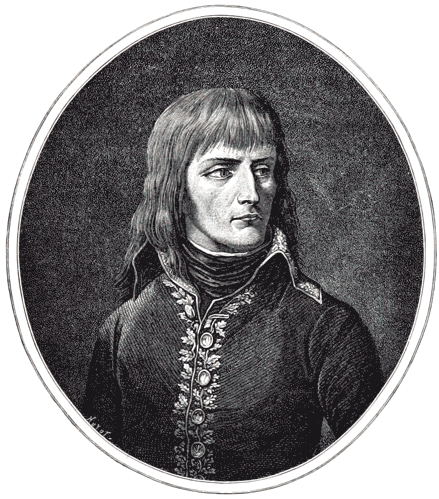
‘Le Général Bonaparte. D'Après un Dessin de J. Guérin, Gravé par G. Fiesinger’
Napoléon Ier et Son Temps - Roger Peyre (p67, 1888)
The British Library
Book XIX: Chapter 10: The Days of Vendémiaire
BkXIX:Chap10:Sec1
The death of Robespierre did not bring all to an end: the prisons only disgorged slowly; on the eve of the day when the dying tribune was carried to the scaffold, eighty victims were executed, so well-organised were their murders, so ordered and disciplined was the process of death! The two Sansons, the executioners, were put on trial; more happily for them than for Roseau, the executioner of Tardif, for the Duc de Mayenne, they were acquitted: the blood of Louis XVI had laved them.
The reprieved prisoners did not know what to do with their lives, the idle Jacobins how to spend their days; that prompted the balls and regrets of the Terror. It was only little by little that judicial authority was clawed back from the members of the Convention; they would not cease their criminal acts, for fear of losing power. The Revolutionary Tribunal was abolished.
André Dumont proposed that Robespierre’s heirs should be hunted down; the Convention, urged on despite itself, reluctantly decreed, after a report by Saladin, that it was necessary to place Barère, Billaud de Varennes, and Collot d’Herbois, under arrest, the two latter being friends of Robespierre, who had nevertheless contributed to his fall. Carrier, Fouquier-Tinville, and Joseph Lebon, were tried; their crimes were revealed, notably the republican marriages and drowning of six hundred young people at Nantes. The Sections, among whom the National Guard happened to be divided, accused the Convention of past evils, and feared lest they were repeated. The society of Jacobins still fought on; they showed no repugnance for death. Legendre, once so violent, became human once more, and joined the Committee of General Security. On the night of Robespierre’s torments, he sealed the lair; but eight days afterwards the Jacobins were re-established under the name of the Regenerated Jacobins. The women with their knitting were there again. Fréron published his resuscitated paper L’Orateur du Peuple, and while applauding the fall of Robespierre vigorously, he bowed to the power of the Convention. Marat’s bust remained on view; the various committees, merely changing form, still existed.
A severe cold-spell and famine, combined with the political troubles, complicated the calamity: armed groups, augmented by women, formed shouting: ‘Bread! Bread!’ At last on the 1st Prairial (20th of May 1795) the door of the Convention was forced, Féraud assassinated, and his head planted on the President’s desk. They tell of Boissy d’Anglas’ impassivity; bad luck to whoever opposes an act of virtue!
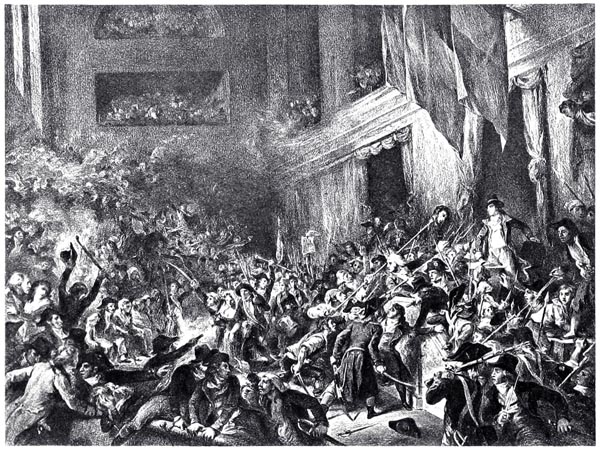
‘La Convention est Forcée’
Tableaux Modernes de Premier Ordre - Hôtel Drouot (p39, 1886)
Internet Archive Book Images
The revolutionary vegetation pushed vigorously through the layer of manure, reddened with human blood, which served it as a base. Rossignol, Huchet, Grignon, Moïse Bayle, Amar, Choudieu, Hentz, Granet, Léonard Bourdon, all those distinguished by their excess, were penned behind the railings; yet our glory lay outside. While opposition to the Members of the Convention mounted, our triumphs against foreign nations stifled the public clamour. There were two Frances: one terrible within, the other admirable without; glory was juxtaposed with our crimes, as Bonaparte juxtaposed it with our freedoms. We have always found victory ahead of us like a dangerous reef.
It is useful to note the anachronism committed by attributing our success to the enormities we perpetrated: success was achieved before and after the Reign of Terror; thus the Terror counted for nothing in the achievements of our armies. But success had a drawback: it cast a halo round the heads of those revolutionary spectres. One knows without question the date on which this glow attached itself to them: the taking of Holland, the passage of the Rhine, seemed like conquests with the axe, not the sword. In that confusion one failed to see how France could manage to free herself from the clogs which, despite the disaster which met the leading culprits, continued to oppress her: yet the liberator was at hand.
Bonaparte had kept with him the greater and worse part of the group of friends with whom he had become acquainted in the south and who, like him, had taken refuge in the capital. Saliceti, still a power among the Jacobin fraternity, was close to Napoleon; Fréron wishing to marry Pauline Bonaparte (Princess Borghèse) had the support of his future brother-in-law.
Far from the screeches of the forum and the tribune, Bonaparte walked in the Jardin des Plantes in the evening with Junot. Junot told him of his passion for Paulette, Napoleon confided in him his attraction towards Madame de Beauharnais: events had hatched a great man. Madame de Beauharnais had ties of friendship with Barras: it is probable that the relationship prompted the Commissioner of the Convention’s memory, when the decisive moment arrived.
Book XIX: Chapter 11: The Days of Vendémiaire - Continued
BkXIX:Chap11:Sec1
Press freedom having been re-introduced, for a while it worked with a sense of deliverance; but as the democrats had no liking for that liberty and as the press savaged their mistakes, they accused it of being royalist. The Abbé Morellet, and Laharpe, fired off pamphlets to join those of the Spaniard Marchenna, that foul savant and abortion of the spirit. The young wore grey coats with lapels and black collars, renowned as the uniform of the Chouans. The meeting of the new legislature was the pretext for the gathering of the Sections. The Lepelletier Section, formerly known under the name of the Filles-Saint-Thomas Section, was the most vigorous; it appeared several times at the bar of the Convention to protest: Lacretelle the younger leant his voice to it with the same courage he showed on the day when Bonaparte bombarded the Parisians on the steps of Saint-Roch. The Sections, anticipating that the moment of struggle neared, summoned General Danican from Rouen to place him at their head. One can judge the fear of, and the sentiments of the Convention towards, the defenders they had gathered round them: ‘To the head of these Republicans,’ says Réal in his Essai sur les Journées de Vendémiaire, ‘who are known as the sacred battalion of the patriots of ’89, and into their ranks, they summoned those veterans of the Revolution who had served in six campaigns, who had fought beneath the walls of the Bastille, who had beaten down tyranny, and who armed themselves now to defend the same château they had attacked on the 10th of August. There I found the precious remnants of those old battalions of men from Liège, from Belgium, under the command of their former general Fyon.’
Réal ends his account with this exclamatory address: ‘O you, through whom Europe has been conquered by a government without governors and armies without pay, Spirit of Liberty, watch over us yet!’ Those proud champions of freedom had lived through more than a few ‘days’; they went off to end their hymns to liberty in the police bureaux of a tyrant. Today that period is no more than a shattered outcrop over which the Revolution passed. Men who have spoken and acted with energy are passionate about events which no longer interest anyone! Living men gather the fruits of forgotten lives consumed on their behalf.
We have reached the revival of the Convention; the foremost assemblies were convened: committees, clubs, sections, made a terrible din.
The Convention, threatened by popular aversion, realised that it must defend itself: it countered Danican with Barras, named leader of the armed forces of Paris and the Interior. Having met Bonaparte in Toulon, and having been reminded of him by Madame de Beauharnais, Barras was struck by the help such a man might provide to him: he appointed him as his second-in-command. The future Director, supporting the Convention during the events of Vendémiaire, declared that it was to the prompt and expert dispositions made by Bonaparte that they owed the salvation of those encircled, around whom he had distributed the defenders with great skill. Napoleon struck at the Sections saying: ‘I have set my mark on France.’ Attila said: ‘I am the hammer of the world, ego malleus orbis.’
After this success, Napoleon feared that he had made himself unpopular, and made certain that he gave several years of his life to erasing that page of his history.
There is in existence an account of the events of Vendémiaire from Napoleon’s own hand: it attempts to prove that it was the Sections who commenced firing. In encountering them he might have imagined he was still in Toulon: General Carteaux was at the head of a column on the Pont Neuf; a company from Marseilles marched on Saint-Roch; the positions occupied by the National Guard were successively carried. Réal, in the narrative of which I have already spoken, ended his exposition with these stupidities that show the Parisians standing firm: there is a wounded man who, crossing the Salon des Victoires, recognises a flag he had taken: ‘Let us go no further,’ he cries in a dying voice, I wish to die here’; there is the wife of General Dufraisse who tears up his shirt for bandages; there are Durocher’s two daughters who administer vinegar and brandy. Réal attributed everything to Barras: a sycophantic elision; it shows that Napoleon in Year IV, victorious for another’s gain, was not yet taken into account.
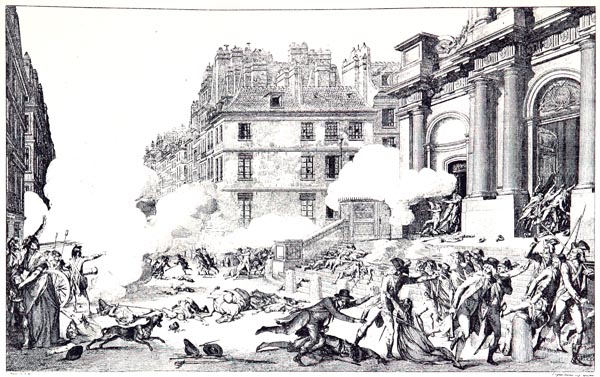
‘Journée du 13 Vendémiaire an IV; église Saint-Roch, rue Honoré (Dessin de Monet, Gravure de Duplessis-Bertaux)’
Napoléon Ier et Son Temps - Roger Peyre (p73, 1888)
The British Library
Despite his triumph, Bonaparte did not expect rapid success, since he wrote to Bourrienne: ‘Look out for a small property in your lovely Yonne valley; I will buy it when I have some money; but don’t forget I don’t want any national (church) property.’ In the Yonne valley lived Madame de Beaumont and Monsieur Joubert. Bonaparte changed his mind during the Empire: he took plenty of notice of national property. The riots of Vendémiaire ended that epoch of riots: they were not repeated until 1830, to finish off the monarchy.
Four months after the events of Vendémiaire, on the 19th Ventôse Year IV (9th of March 1796), Bonaparte married Marie-Josèphe Rose de Tascher. The certificate makes no mention of as her as the widow of the Comte de Beauharnais. Tallien and Barras were the witnesses to the contract. On the 2nd of March Bonaparte had been appointed general of the troops stationed in the Alpes Maritimes; Carnot opposed Barras in demanding the honour of this nomination. The command of the Army of Italy was described as Madame Beauharnais’ dowry. Napoleon, who spoke of this at St. Helena, with disdain, knowing he allied himself to a great lady, lacked gratitude.
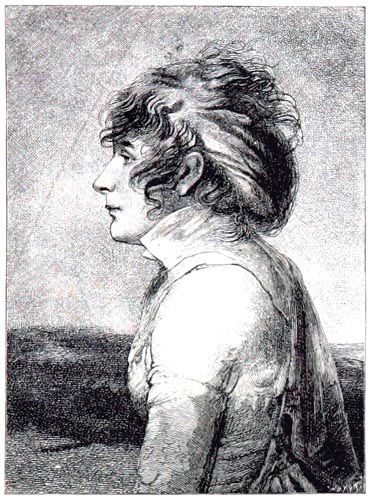
‘Joséphine, par Isabey; Coiffure « à la Coup de Vent »’
Napoléon Ier et Son Temps - Roger Peyre (p75, 1888)
The British Library
Napoleon entered fully into his destiny: he needed men, men would have need of him; events made him, he would make events. He had now passed through those misfortunes to which superior natures are condemned before being recognised, forced to humble themselves before mediocrities whose patronage is necessary to them: the seed of the tallest palm-tree is at first protected, by the Arabs, under a clay pot.
Book XIX: Chapter 12: The Italian Campaign
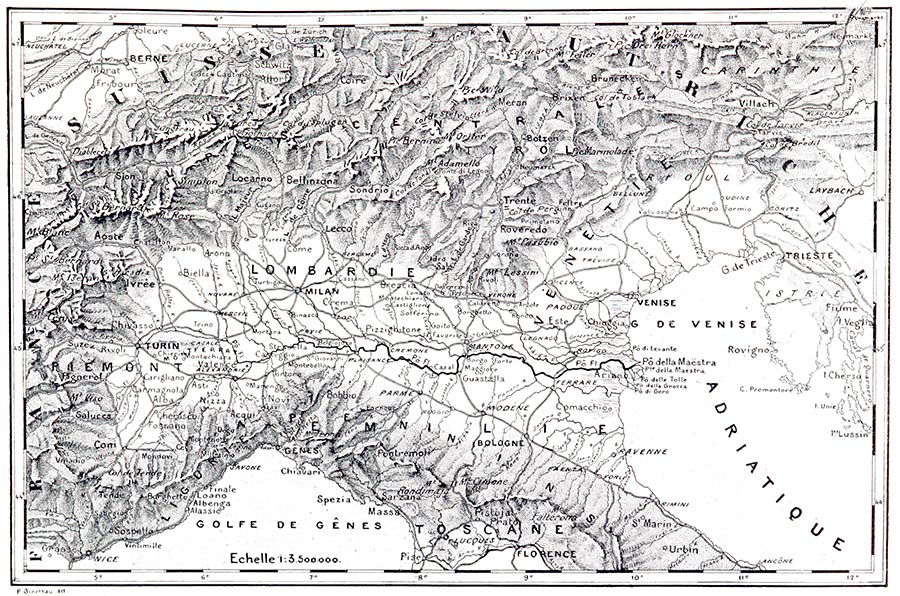
‘Carte Générale pour l'Histoire des Campagnes d'Italie’
Napoléon Ier et Son Temps - Roger Peyre (p89, 1888)
The British Library
BkXIX:Chap12:Sec1
Arriving in Nice, at the headquarters of the Army of Italy, Bonaparte found the soldiers in a state of total deprivation, half-naked, without boots, bread, or discipline. He was twenty-six years old; under his command he had Masséna with thirty-eight thousand men. It was the year 1796. He opened his first campaign on the 27th of March, a notable date among those which came to be etched on his life. He defeated Beaulieu at Montenotte; two days later, at Millesimo he split the Austrian and Sardinian armies. At Ceva, Mondovi, Fossano, and Cherasco the success continued; the spirit of war itself had descended. The proclamation of peace caused a new voice to be heard, just as the battles had announced a new man:
‘Soldiers, in fifteen days, you have gained six victories, taken twenty-one flags, fifty-five pieces of canon, fifteen thousand prisoners, and killed or wounded more than ten thousand men! You have won battles with guns, crossed rivers without bridges, made forced marches without boots, bivouacked without brandy, and often without bread. The Republican phalanxes, the soldiers of liberty alone were capable of suffering what you have suffered; thanks are due you, soldiers! ...
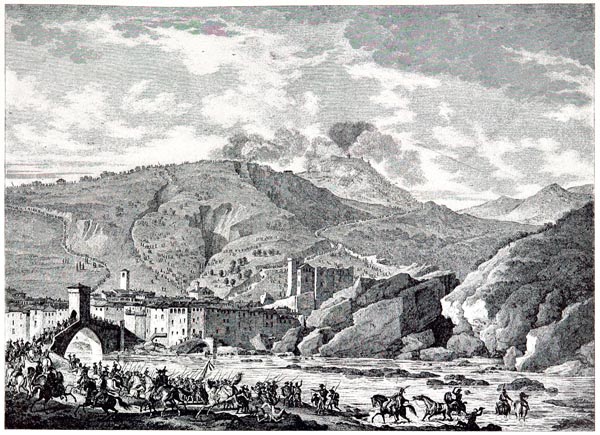
‘Bataille de Milessimo (14 Avril 1796). Dessiné par Carie Vernet, Gravé par Duplessis-Bertaux’
Napoléon Ier et Son Temps - Roger Peyre (p93, 1888)
The British Library
People of Italy! The French army has come to break your chains; the French people are friends with all nations. We are angry only with the tyrants who enslave you.’
On the 15th of May peace was concluded between the French Republic and the King of Sardinia; Savoy was ceded to France with Nice and Tende. Napoleon kept advancing, and wrote to Carnot:
‘From headquarters at Piacenza, 9th of May 1796
We have crossed the Po at last: the second campaign has begun; Beaulieu is confounded; he miscalculates badly, and constantly falls into the traps one sets for him. Perhaps he is keen to give battle, since the man has the courage of anger, and not that of genius. One more victory and we are masters of Italy. The moment that we cease the advance, we will re-equip the army. It always inspires fear; but has grown fat; the soldiers only eat white bread, and excellent meat in quantity, etc. Discipline is being established day by day; but it is often necessary to shoot some of them, since they are intractable creatures without self-control. What we have done to the enemy is incalculable. The more men you send me the more easily I will feed them. I am having twenty paintings by the most important masters, Corregio and Michelangelo, shipped to you. I owe you special thanks, for the attention you have been so good as to show my wife. I recommend her to you: she is a true patriot, and I love her deeply. I hope things are going well, being in a position to send to you in Paris, twelve millions: that will not do you too badly for the Army of the Rhine. Send me four thousand un-mounted cavalrymen, I will find a way to provide them with mounts here. I will not conceal from you, that since the death of Stengel, I no longer have a first class cavalry officer for a fight. I would like you to send me two or three adjutants with some fire, and a firm resolution never to make cautious retreats.’
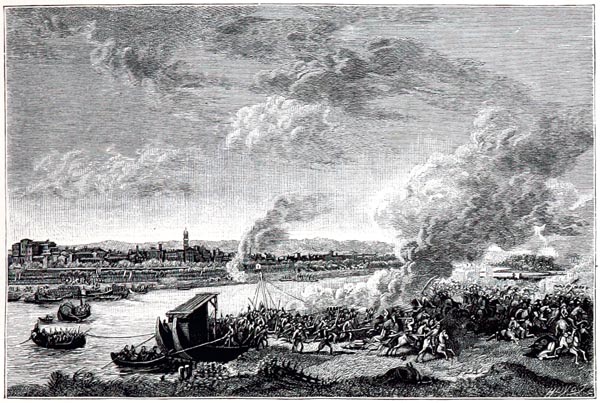
‘Passage du Pô, Peint sur le Lieu par Bacler Dalbe’
Napoléon Ier et Son Temps - Roger Peyre (p99, 1888)
The British Library
It is one of Napoleon’s most remarkable letters. What vivacity! What variety of genius! With news of heroics we find, thrown into this triumphant profusion, pell-mell, Michelangelo’s art, sharp wit directed against a rival regarding adjutants firmly resolved never to make cautious retreats. On the same day, Bonaparte wrote to the Directory, to give notice of the suspension of hostilities agreed with the Duke of Parma, and to send on Correggio’s Saint Jerôme. On the 11th of May, he announced to Carnot the crossing of the bridge at Lodi, which gave France possession of Lombardy. If he did not proceed to Milan immediately, it was because he wished to pursue Beaulieu and finish him off. – ‘If I take Mantua, there is nothing to stop me from penetrating Bavaria; in twenty days I can reach the heart of Germany. If the two Armies of the Rhine begin a campaign, I beg you to let me know their positions. It would be worthy of the Republic if three united armies signed a peace treaty at the heart of Bavaria and a stunned Austria.’
BkXIX:Chap12:Sec2
The eagle does not march it flies, adorned with the banners of victory draped from its neck and wings.
He complains that they want to give him Kellerman as deputy: ‘I cannot serve willingly with a man who thinks himself Europe’s greatest general, and I believe a single bad general is better than two good ones.’
On the 1st of June 1796 the Austrians were driven from Italy completely and our advance-guard was reconnoitring the mountains of Germany: ‘Our grenadiers and our carabiniers,’ Bonaparte wrote to the Directory, ‘toy with and laugh at death. Nothing equals their fearlessness, unless it is the cheerfulness with which they endure long forced marches. You might think that once they have made camp they at least must sleep; not at all: each makes up his report or describes his plan of campaign for next day, and often one sees by that who come across most soundly. The other day I was watching a half-brigade marching by; a chasseur approached my horse: “General,” he said to me, “such and such must be done”. – “Wretch,” I said to him, “will you be silent!” He disappeared instantly; I had him searched for in vain: precisely what I ordered had been done to him.’
The soldiers promoted their commander: at Lodi he was a corporal, at Castiglione a sergeant.
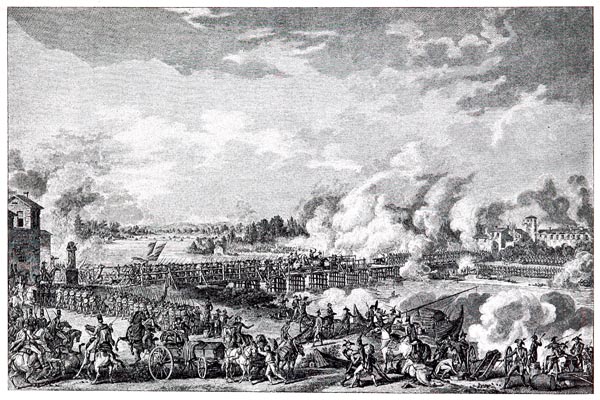
‘Passage du Pont de Lodi (9 mai 1796) d'Après le Dessin de Carie Vernet et la Gravure de Duplessis-Bertaux’
Napoléon Ier et Son Temps - Roger Peyre (p103, 1888)
The British Library
On the 17th of November they advanced on Arcola: they young general crossed the bridge which made him famous; ten thousand men were left on the field. ‘It was a chapter from the Iliad!’ Bonaparte cried at the mere memory of that action.
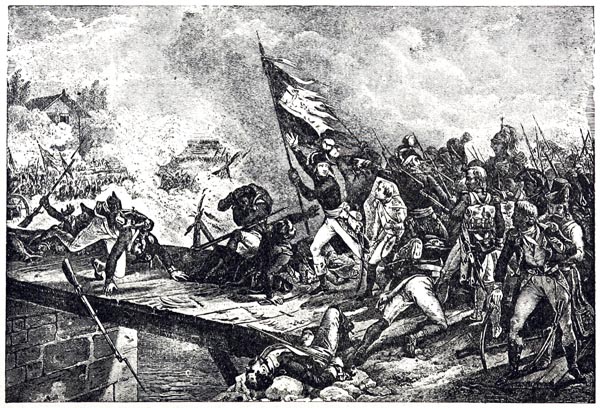
‘Bonaparte at the Bridge of Arcole, November 15, 1796’
The History of the French Revolution, 1789 to 1795; or a Country Without a God - Henry H. Northrop (p746, 1890)
The British Library
In Germany, Moreau carried out the celebrated retreat that Napoleon jealousy called a sergeant’s retreat. Bonaparte was preparing to say to his rival, on beating Archduke Charles:
‘I will follow your illustrious retreat, so near
As to handle him without an interpreter.’
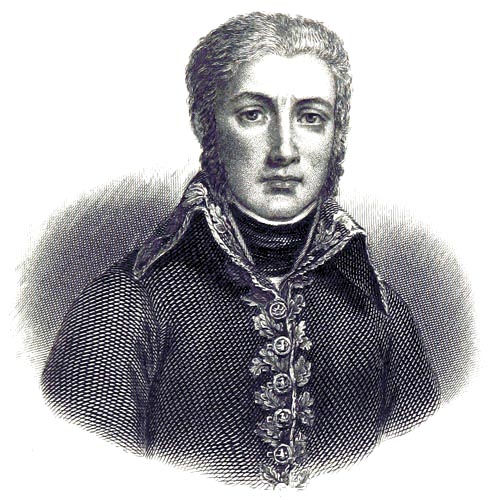
‘Jean-Victor Moreau’
The History of the French Revolution. Translated by F. Shoberl, Vol 05 - Louis Adolphe Thiers - President of the French Republic (p137, 1881)
The British Library
On the 14th of January 1797, hostilities were renewed at the battle of Rivoli. Two confrontations with Wurmser, at San Giorgio and at La Favorita, entailed for the enemy the loss of five thousand dead and twenty thousand prisoners; the inhabitants barricaded themselves in Mantua; the town, blockaded, capitulated; Wurmser, with the twelve thousand men remaining to him, surrendered.
BkXIX:Chap12:Sec3
The March of Ancona was soon invaded; later the Treaty of Tolentino brought the French pearls, diamonds, precious manuscripts, the Transfiguration, the Laocoon, the Apollo Belvedere, and ended this sequence of military operations during which in less than a year four Austrian armies had been destroyed, northern Italy subjugated and the Tyrol opened up; there was hardly time to know where one was: the lightning and the blow fell together.
Archduke Charles, hastening to defend the Austrian front with a fresh army, is forced back at the River Tagliamento; Gradisca falls; Trieste is taken; the preliminaries of peace between France and Austria are signed at Leoben.
Venice, created during the fall of the Roman Empire, betrayed and troubled, opened its lagoons and palaces to us; a revolution (31st of May, 1797) took place in its rival Genoa: the Ligurian Republic was born. Bonaparte would have been astonished if, in the midst of his conquests, he could have known that he was seizing Venice for Austria, the Papal Legations for Rome, Naples for the Bourbons, Genoa for Piedmont, Spain for England, Westphalia for Prussia, and Poland for Russia, like those soldiers who, in sacking a town, load themselves with spoils they are forced to abandon, being unable to carry them, while at that very moment they are losing their native land.
On the 9th of July, the Cisalpine Republic was proclaimed. In Bonaparte’s correspondence one can see him shuttling between these links in the chain of revolutions connected to our own: like Mahomet with the scimitar and the Koran, we advanced with a sword in one hand, the rights of man in the other.
In the mass of general activity, Bonaparte lets no detail escape him: now he fears lest the old masters, works of the great painters of Venice, Bologna, and Milan get a wetting crossing Mont Cenis; now he is anxious lest a papyrus manuscript from the Ambrosian Library is lost; he begs the Minister of the Interior to let him know if it has arrived at the National Library. He gives the Executive Directors his opinion of his generals:
‘Berthier: talent, energy, courage, and character, he has everything going for him.
Augereau: plenty of character, courage, steadiness, energy; liked by the soldiers, fortunate in what he undertakes.
Masséna: active, indefatigable, has the courage, quickness of eye, and readiness to make decisions.
Sérurier: fights alongside his men, lacks initiative; steadfast; has a poor opinion of his troops; is ill.
Despinois: lethargic, without energy or courage, not fit for war, not liked by his men, does not fight at the front; other than that he has stature, intelligence, and sound political principles; fine as a commander in the interior.
Sauret: good, a very good soldier, not bright enough to be a general; unlucky.
Abbatucci: not fit to command fifty men, etc, etc.’
Bonaparte writes to the leader of the Maniots: ‘The French esteem that small, but brave people who, alone of ancient Greece, have retained their virtue, worthy descendants of Sparta, who only lack a presence in a wider theatre to achieve their ancestors’ fame.’ He instructs the authorities to take possession of Corfu: ‘The island of Corcyra,’ he remarks, ‘was, according to Homer, the land of Princess Nausicaa.’ He sends off the peace treaty concluded with Venice: ‘Our navy acquired four or five men of war there, three or four frigates, and three or four million lines of rigging – Give me French or Corsican sailors,’ he requests; ‘I will take those of Mantua or Guarda. – A million for Toulon, as I told you, goes off tomorrow; two millions, etc., will make the sum of five millions that the Army of Italy will have supplied during the latest campaign. – I have charged.with going to Sion to try and open negotiations with the Valais. – I have sent an excellent engineer to find out how much it would cost to open up that route (the Simplon). I have charged the same engineer with seeing what it would take to blow up the rocks through which the Rhône escapes, and by so doing to make the exploitation of the woods of Valais and Savoy possible.’ He gives notice that he is about to send a load of wheat and steel from Trieste to Genoa. He makes a present to the Pasha of Scutari of four cases of rifles, as a mark of friendship. He orders several suspects to be sent back to Milan, and has several others arrested. He writes to Citizen Groignard, the naval administrator at Toulon: ‘I am not your judge, but if you were under my command, I would put you under arrest for having sanctioned such a ridiculous requisition.’ A note handed to the Pope’s minister reads: ‘The Pope will perhaps consider it worthy of his wisdom, of the holiest of religions, to issue a Bull or a mandate ordering priests to obey the government.’
All this was intermingled with his negotiations with the new Republics, details of festivals celebrating Virgil and Ariosto, explanatory dockets for twenty Venetian paintings and five hundred manuscripts; all this conducted in an Italy deafened with the sounds of battle, an Italy become a furnace in which our grenadiers existed like salamanders in the flames.
Within this whirlwind of events and victories the 18th Fructidor arrived, encouraged by Bonaparte’s proclamations and the debates among his troops jealous of the Army of the Meuse. Then the man who, perhaps wrongly, was considered the author of the plans which brought Republican victories, vanished; we were assured that Danissy, Lafitte and D’Arcon, three superior military geniuses, had directed those plans: Carnot found himself proscribed through Bonaparte’s influence.
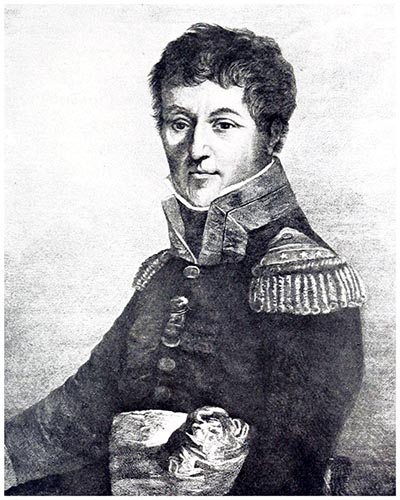
‘Lazare-Nicolas-Marguerite Carnot’
The Days of the Directoire - Alfred Richard Allinson, John Colby Abbott (p87, 1910)
Internet Archive Book Images
On the 17th of October, the latter signed the Peace treaty of Campo-Formio: the first Continental War waged by the Revolution ended thirty leagues from Vienna.
Book XIX: Chapter 13: The Congress of Rastadt – Napoleon’s return to France – Napoleon is named Commander of the Army against England – He leaves on the Egyptian Expedition
BkXIX:Chap13:Sec1
A Congress was established at Rastadt, and Bonaparte, having been named as the Directory’s representative at the congress, took leave of the Army of Italy. ‘I am only consoled, ‘he announced to them, ‘by the expectation of finding myself with you again soon, struggling against new dangers.’ On the 16th of November 1797, his order of the day proclaimed that he had left Milan in order to preside over the French embassy to the conference, and that he had sent the flag of the Army of Italy to the Directory.
On one side of the banner Napoleon had ordered this summary of his victories to be embroidered:
‘One hundred and fifty thousand prisoners, seventeen thousand horses, five hundred and fifty siege-guns, six-hundred field pieces, five bridge kits, nine fifty-four gun vessels, twelve thirty-two gun frigates, twelve corvettes, eighteen galleys; an armistice with the King of Sardinia, a convention with the Genoans; an armistice with the Duke of Parma, with the Duke of Modena, with the King of Naples, with the Pope; the preliminaries of Leoben; the convention of Montebello with the Genoan Republic; the peace treaty with the Emperor at Campo-Formio; liberty granted to the people of Bologna, Ferrara, Modena, Massa-Carrara, Romagna, Lombardy, Brescia, Bergamo, Mantua, Cremona, part of Verona, Chiavenna, Bormio, and Valtellina; to the people of Genoa, to the Imperial fiefs, to the people of the departments of Corcyra, the Aegean Sea, and Ithaca.
Sent to Paris all the master-works of Michelangelo, Guercino, Titian, Paolo-Veronese, Correggio, Albani, Carrachi, Raphael, Leonardo da Vinci etc., etc.
‘This remembrance of the Army of Italy,’ says the order of the day,‘will be suspended from the ceiling of the public meeting room of the Directory, and will bear witness to the exploits of our soldiers when the present generation has vanished.’
After a purely military convention which stipulated the relinquishment of Mainz to Republican troops and that of Venice to Austrian troops, Bonaparte quit Rastadt and left the rest of the business of the Congress to Treilhard and Bonnier.
In the final period of the Italian Campaign, Bonaparte suffered much from the envy of various generals and the Directory: twice he offered his resignation; the members of the government desired it but dared not accept it. Bonaparte’s sentiments did not conform to the tendencies of the century; he yielded reluctantly to forces generated during the Revolution: from this arose the contradictions in his actions and ideas.
Returning to Paris, he arrived at his house on the Rue Chantereine, which took the name which it bears today, Rue de la Victoire. The Council of Elders wanted to make Napoleon the gift of Chambord, that work of Francois I, which now only recalls the exile of Saint Louis’ last descendant. Bonaparte was presented to the Directory on the 10th of December 1797, in the courtyard of the Luxembourg Palace. In the centre of the courtyard an altar to the Motherland had been erected, topped by statues of Liberty, Equality, and Peace. The flags of conquest formed a canopy above the five Directors dressed in classical style; the shadow of Victory was cast by these flags, beneath which France halted for a moment. Bonaparte was dressed in the uniform he had worn at Arcola and Lodi. Monsieur de Talleyrand received the victor at the altar, reviving memories of his formerly having said mass at another altar. Having fled to and returned from the United States, charged through Chénier’s patronage with the Foreign Ministry, the Bishop of Autun, sword at his side, was wearing a hat in the style of Henri IV: events required one to take these travesties seriously.
The prelate praised the conqueror of Italy: ‘He loves,’ he said in a melancholy manner, ‘he loves the poems of Ossian, especially because they raise one above the earth. Far from fearing what is said to be his ambition, perhaps we will have to solicit it one day to drag him from the delights of his studious retreat. All of France will be free; perhaps he himself will never be so: such is his destiny.’
Marvellously prescient!
Saint Louis’ brother at Grandella, Charles VIII at Fornovo, Louis XII at Agnadello, Francis I at Marignan, Lautrec at Ravenna, Catinat at Turin, were no match for this new general. Napoleon’s success was un-shadowed by a Pavia.
The Directors, fearing this superior despotism that threatened all despotism, watched the homage being rendered to Napoleon, with anxiety; they considered ridding themselves of his presence. They looked with favour on the desire he showed for an expedition to the East. He said: ‘Europe is a mole-hill; the great empires and revolutions have all been in the East; already my glory is exhausted: this tiny Europe does not offer enough.’ Napoleon, like a child, was delighted to be elected as a member of the Institute. He asked for a mere six years to reach the Indies and return. ‘I am only twenty-nine,’ he remarked, on consideration, ‘that’s no age at all: I will only be thirty-five when I return.’
Named as commander of the Army against England, its corps scattered from Brest to Antwerp, Bonaparte spent his time carrying out inspections, and making visits to civil and scientific authorities, while the troops destined to compose the Army of Egypt were being assembled. Disturbances took place regarding the tricolour and the red bonnet that our Ambassador in Vienna, General Bernadotte, had draped over the entrance to the Embassy. The Directory was inclined to retain Napoleon in order to combat the possibility of fresh warfare, when Count von Cobenzl avoided a rupture, and Bonaparte received the order to depart. With Italy now republican, Holland a republic, peace allowed France extending to the Rhine, the soldiers idle, the Directory fearful with anxiety hastened the conqueror’s departure. This Egyptian adventure enhanced at a stroke Napoleon’s luck and genius, by gilding his genius, already excessively bright, striking with a ray of sunlight the pillars of cloud and fire.
Book XIX: Chapter 14: Malta – The Battle of the Pyramids – Cairo – Napoleon inside the Great Pyramid – Suez.
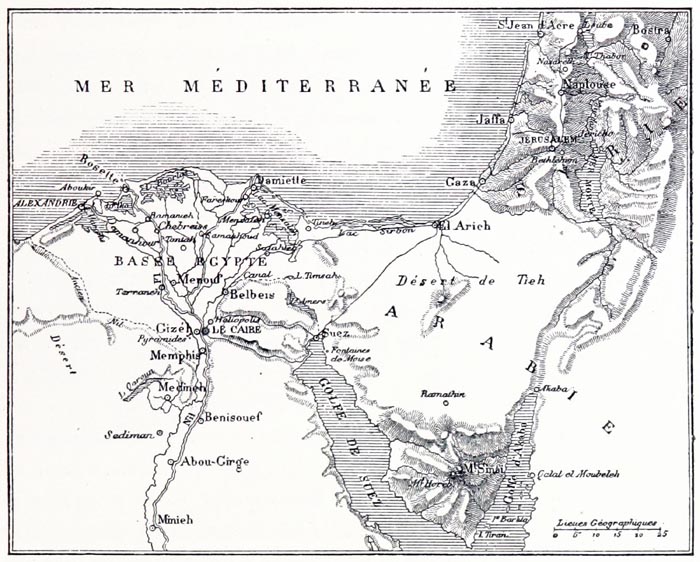
‘Carte de la basse Égypte’
Napoléon Ier et Son Temps - Roger Peyre (p201, 1888)
The British Library
BkXIX:Chap14:Sec1
Toulon, 19th May 1798.
PROCLAMATION.
‘Soldiers,
You are one flank of the Army against England.
You have made war in the mountains, in the plains, you have conducted sieges; it only remains for you to make war at sea.
The Roman legions you have often imitated but not yet equalled fought Carthage time after time over this same sea, and on the plain of Zama. Victory never forsook them, because they were continually brave, patient in withstanding fatigue, disciplined and united.
Soldiers, Europe is watching you! You have a great destiny to fulfil, battles to wage, danger and weariness to vanquish; you will achieve more than you already have for your country’s prosperity, the benefit of men and your own glory.’
After this memorable proclamation, Napoleon embarked: as in Homer one might say, or like the hero who kept Maeonides’ songs in a golden casket. This man never trod softly: scarcely had he left Italy behind than he appeared in Egypt; an episode from fiction with which he embellished real life. Like Charlemagne he brought epic to history. In the library he carried with him were to be found Ossian, Werther, La Nouvelle Héloïse and the Old Testament: an indication of the chaos inside Napoleon’s head. He mingled together positive ideas with sentimental novels, systems with chimeras, serious studies with transports of the imagination, wisdom with folly. With these incoherent products of the century he took an Empire; an immense dream, but as transient as the disorder of the night that bore him.
Entering Toulon on the 9th of May 1798, Napoleon halted at the Hôtel de la Marine; ten days later he boarded the flagship L’Orient; on the 19th of May he set sail; he left from the port where he had first shed blood, French blood: the massacres at Toulon had prepared him for the massacres at Jaffa. He took with him the first generals born of his glory: Berthier, Caffarelli, Kléber, Desaix, Lannes, Murat, and Menou. Thirteen ships of the line, fourteen frigates, and four hundred transport vessels accompanied him.
Nelson allowed him to escape from port and lost him among the waves, though at one point our fleet was less than six leagues distant from the English ships. From Sicilian waters, Napoleon saw the summit of the Apennines; he said: ‘I cannot view Italian soil without emotion; there is the East; I am on my way there.’ On seeing Mount Ida, there followed an outburst of admiration regarding Minos and ancient wisdom. During the crossing, Bonaparte delighted in gathering the savants together and provoking disputes among them; he was usually won over to the most absurd or most audacious viewpoint; he questioned whether the planets were inhabited, when they would be destroyed by water or fire, as if he had been charged with inspecting a celestial army.
BkXIX:Chap14:Sec2
He landed at Malta, and winkled out the old chivalry that had withdrawn into a hole in a rock by the sea; then he descended on the ruins of Alexander’s city. At the break of day he saw that same Pompey’s Pillar that I caught sight of from my ship on leaving Libya. From the foot of the monument, immortalised by a great and sorrowful name, he made a dash forward; he climbed the walls behind which was once found the storehouse of medicines for the soul, and Cleopatra’s Needles, now lying on the ground among the skinny dogs. The port of Rosetta was forced; our troops rushed towards the two harbours and the lighthouse. There was a terrible cutting of throats! The adjutant-general Boyer wrote to his relatives: ‘The Turks, driven back on all sides, took refuge in their god and their prophet; they filled the mosques; men, women, old, young, children, all were massacred.’
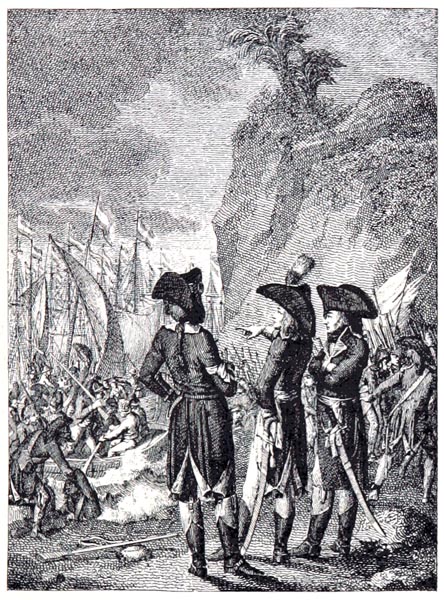
‘Bonaparte Débarque en Égypte, d'Après une Gravure de la Collection Hennin’
Napoléon Ier et Son Temps - Roger Peyre (p199, 1888)
The British Library
Bonaparte had said to the Bishop of Malta: ‘You can assure your diocese that the Catholic religion, apostolic and Roman, will not only be respected, but its ministers will be given special protection.’ He said, on arrival in Egypt: ‘People of Egypt, I respect God, his Prophet, and the Koran more than the Mamelukes do. The French are friends of the Muslims. Previously they have marched on Rome and overthrown the rule of a Pope who embittered Christians against those who profess Islam; soon afterwards they set course towards Malta, and have driven from there the unbelievers who thought to call on God to make war against Muslims..if Egypt is leased to the Mamelukes, let them show us the lease God has given them.’
Napoleon marched to the Pyramids; he announced to his soldiers: ‘Soldiers, from the heights of these monuments forty centuries are gazing down upon you.’ He entered Cairo; his fleet was blown to the sky at Aboukir; the Army of the East was cut off from Europe. Jullien (de Paris), son of the Jullien (de la Drôme) who was a Member of the Convention, witness to the disaster, noted it minute by minute:
‘It was seven in the evening; night fell and the firing redoubled. At a few minutes past nine the ship blew up. At ten the firing died down and the moon rose to the right of the place the explosion had come from.’
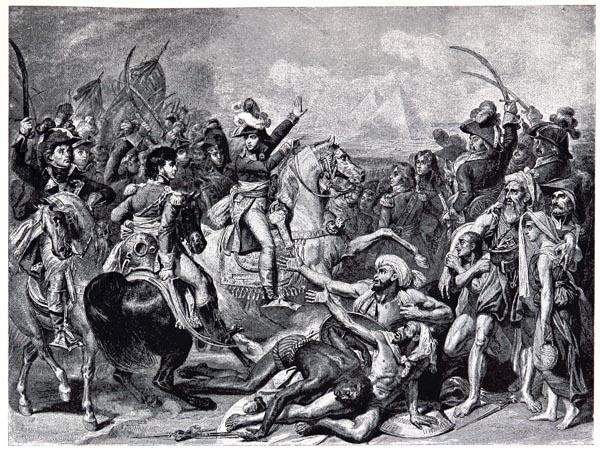
‘Bataille des Pyramides (21 juillet 1798), Tableau de Gros, Musée de Versailles’
Napoléon Ier et Son Temps - Roger Peyre (p205, 1888)
The British Library
In Cairo Bonaparte declares to the chief justice that he will be the restorer of mosques; he broadcasts his name through Arabia, Ethiopia, and India. Cairo rebels; he bombards it in the midst of a storm; the inspired one speaks to the believers: ‘I could demand that each of you make an account of the most secret feelings of his heart, since I know all, even those things you have told to no one.’
The high Sherif of Mecca names him, in a letter, the protector of the Ka’aba; the Pope, in a missive, calls him my very dear son.
Through a weakness of character, Bonaparte often preferred to address his petty rather than his grand side. The game he could win with a blow failed to amuse him. The hand which shattered the world enjoyed playing with tumblers; assured, when it exerted its powers, of compensating for this waste, his genius mended the defects of his nature. Did he not present himself above all as the heir of the crusaders? Through his twofold status, he was, in the eyes of the Muslim masses, both a false Christian and a false Mahometan. To admire the impieties of a belief is to fail to understand what is wretched about it, and to be wretchedly in error: one must weep when a giant is reduced to making grimaces. The infidels offered Saint Louis, in chains, the crown of Egypt, because he remained, say the historians, the finest Christian they had ever seen.
BkXIX:Chap14:Sec3
When I visited Cairo, the city still retained traces of the French: a public garden, an undertaking of ours, was planted with palm-trees; restaurant owners’ establishments had long ago surrounded it. Unfortunately, like the ancient Egyptians, our soldiers promenaded a coffin at their feasts.
What a memorable scene, if one could believe in it! Bonaparte seated inside the Pyramid of Cheops, on a Pharaoh’s sarcophagus from which the mummified remains had vanished, talking to the muftis and imams! However, let us treat the tale in the Moniteur as a work of the Muse. If it is not a true tale of Napoleon, it is the tale of his intellect; that makes it still worth the trouble of reading. In the depths of the sepulchre let us listen to that voice that all the centuries will hear.
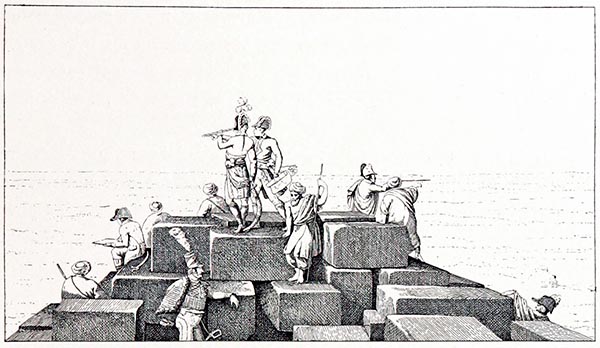
‘Bonaparte sur la Plus Haute des Pyramides d'Égypte, Gravure de la Collection Hennin’
Napoléon Ier et Son Temps - Roger Peyre (p215, 1888)
The British Library
(Moniteur, 27th November 1798.)
‘Today, the 25th Thermidor of Year VI of the one and indivisible French Republic (12th of August 1798), corresponding to the 28th day of the moon of Muharram, in the Year of the Hegira 1213, the Commander-in-Chief accompanied by several army staff officers and members of the National Institute was taken to the Great Pyramid, said to be that of Cheops, in the interior of which he was attended by several muftis and imams, charged with showing him the internal construction.
The final room which the Commander-in-Chief came to is flat-roofed, thirty-two feet long by sixteen wide and nineteen high. There was nothing inside it but a granite box about eight feet long by four wide, which contained a Pharaoh’s mummy. He sat down on the granite block, making the muftis and imams, Suleiman, Ibrahim and Muhamed sit at his feet, and in the presence of his entourage had the following conversation with them:
Bonaparte: ‘God is great and his works are wonderful. Here is a great work from the hand of man! What was the purpose of whoever had this Pyramid constructed?’
Suleiman: ‘It was a powerful king of Egypt, whose name is believed to have been Cheops. He wished to prevent any sacrilege being committed that might disturb his ashes.’
Bonaparte: ‘The great Cyrus had himself interred in the open air, so that his body might return to the elements: do you not think that better? Do you not think so?’
Suleiman (Bowing): ‘Glory to God, to whom all glory is due!’
Bonaparte: ‘Glory to Allah! There is no other God but God; Mohammed is his prophet, and I am one of his friends.’
Ibrahim: ‘May the angels of victory sweep the dust from your robe and cover you with their wings! The Mamelukes deserve death.’
Bonaparte: ‘They have been delivered over to the dark angels Munkar and Nakir.’
Suleiman: ‘They extend their rapacious hands over the land, the harvest, and the horses of Egypt.’
Bonaparte: ‘The wealth, industry and friendship of the Franks will be your portion, until you mount to the seventh heaven and sit beside the black-eyed houris, ever-young and ever-virgin, and rest in the shade of the Tuba, whose branches offer of themselves to true Muslims whatever they might desire.’
Such a spectacle does nothing to alter the gravity of the Pyramids:
‘For twenty centuries, lost in eternal night,
There, without motion, without sound or light.’
Bonaparte, replacing Cheops, in the age-old crypt, would have increased its immensity; but he was never even dragged as far as the vestibule of the dead.
‘During the rest of our navigation of the Nile,’ as I say in the Itinerary, ‘I stayed on the bridge to contemplate the tombs. Great monuments are an essential part of the glory of all human society: they carry the memory of a people beyond its own existence, and make it contemporary with the generations who chance to establish themselves on those deserted fields.’
Let us thank Bonaparte, at the Pyramids, for having represented us so well, all we petty Statesmen marred by poetry, who prowl among the ruins with our wretched lies.
After Bonaparte’s proclamations, orders of the day, speeches, it is evident that he saw himself as a messenger of the heavens, following Alexander’s example. Callisthenes, upon whom the Macedonian later inflicted such cruel treatment, surely in punishment for the philosopher’s flattery of him, was charged with proving that Philip’s son was the son of Jupiter; that is what one reads in a fragment of Callisthenes preserved by Strabo. The Conversations with Alexander, by Pasquier, is a dialogue of the dead between Alexander and Rabelais the great satirist: ‘Run your eye,’ says Alexander to Rabelais, ‘over all those lands you can see down there, and you won’t find anyone of note who, in order to enforce his opinions, won’t want it given out that he is related to the gods.’ Rabelais replies: ‘Alexander, to tell you the truth, I never found it amusing to share any of your little peculiarities, any more than ones involving wine. What benefit do you gain from your greatness now? Are you any different to me? The regret you feel ought to cause you such anger, that it would have been better for you to have lost your memory with your body.’
And yet, in occupying himself with Alexander, Bonaparte was mistaken concerning himself, his epoch of the world, and religion: today, one cannot hope to pass for a god. As for Napoleon’s exploits in the Levant, they were not equivalent as yet to his conquest of Europe; they failed to achieve great enough results to impress the Islamic masses, though they did name him the Sultan of Fire. ‘Alexander, at the age of thirty,’ says Montaigne, ‘had conquered all the known world, and, in half a lifetime, had achieved all that human effort is capable of. More kings and princes have written about his exploits, than any other historians have written concerning any other king.’
From Cairo, Bonaparte passed to Suez: he saw the sea which opened for Moses, and closed again over Pharaoh. He recognised the traces of a canal begun by Sesostris, widened by the Persians, and continued by Ptolemy II, which the Sultans had recommenced with the aim of transporting the commerce of the Red Sea to the Mediterranean. He planned to extend an arm of the Nile into the Arabian Gulf: far along the Gulf his imagination traced out a site for a new Ophir, where a permanent market could be held for the sellers of perfumes, spices and silken stuffs, all the precious objects from Muscat, China, Ceylon, Sumatra, the Philippines, and India. The coenobites would descend from Sinai, and beg him to inscribe his name next to that of Saladin, in the book of their guarantors.
Returning from Cairo, Bonaparte celebrated the annual feast of the founding of the Republic, while addressing these words to his soldiers: ‘Five years ago the freedom of the French people was threatened; but you took Toulon: that presaged the ruin of your enemies. A year later you beat the Austrians at Dego; the following year, you were at the summit of the Alps; you fought at Mantua, two years ago, and brought me the celebrated victory of San Giorgio; last year, you were at the sources of the Drava and Isonzo, on your way back from Germany. Who would have thought then that today you would be on the banks of the Nile, at the heart of an ancient continent?’
Book XIX: Chapter 15: The Army’s opinion
BkXIX:Chap15:Sec1
But was Bonaparte, in the midst of the cares which preoccupied him and the plans he had conceived, truly obsessed? While he appeared to wish to stay in Egypt, fiction had not blinded him to reality, and he wrote to Joseph, his brother: ‘I expect to be in France in two months time; make sure I have a country house when I arrive, near Paris or in Burgundy; I count on spending the winter there.’ Bonaparte never thought for a moment that anyone might oppose his return: his will was his destiny and his fortune. This correspondence having fallen into the Admiralty’s hands, the English dared to suggest that Napoleon had no other object than to destroy his army. One of Bonaparte’s letters contains complaints about his wife’s coquetry.
The French, in Egypt, were all the more heroic in that they felt their ills vividly. A sergeant wrote to one of his friends: ‘Tell Ledoux not to be foolish enough as to embark for this wretched country.’
Avrieury: ‘Everyone who goes inland says that Alexandria is the best of the towns: alas, what must the rest be like! Imagine a confused pile of badly-built one-storey houses; the finest with a terrace, a little wooden door, lock idem; no windows, but a wooden grill so close-made that it is impossible to see anyone on the other side. Narrow streets: except the quarter for the French and the grandees. The poorer inhabitants, who make up the vast number, naked save for a blue shift down to mid-thigh, which is rucked up half the time by their movements, a belt and a ragged turban. I have had my fill of this charming country. I hate being here. Wretched Egypt! Sand everywhere! What a joke of a nation, dear friend! All these fortune seekers, or rather all these thieves, are depressed; they would like to go back where they came from: I can well believe it.’
Rozis, captain: ‘We are very wretched; also there is general discontent in the army; the tyranny has never been as bad as today; we have soldiers who have been put to death in front of the commander in chief, while shouting at him: This is all your doing!’
The name of Tallien shall terminate the list of these virtual unknowns today:
TALLIEN TO MADAME TALLIEN.
‘As for me, my dear friend, I am here, as you know, much against my will; my situation becomes more disagreeable day by day, since, far from my country, and all I hold dear, I cannot foresee the time when I will return to it.
I confess to you freely, I would a thousand times prefer to be settled with you and your daughter in some corner of the earth, far from all passion, all intrigue, and I assure you that if I have the good fortune to touch the soil of my own land again, it will be in order to leave it no more. Among the forty thousand Frenchmen here, there are scarcely four of them who think otherwise.
Nothing is sadder than the life we lead here! We lack everything. For five days I have not closed my eyes; I am lying on the floor; the flies, bugs, ants, mosquitoes, all the insects devour us, and twenty times a day I regret our delightful cottage. I beg you, my dear friend, don’t relinquish it.
Farewell, my good Thérésia, tears flood the paper. The sweetest memories of your kindness, of our love, the hope of finding you ever-loving, ever-faithful, of embracing my dear daughter, they alone sustain me in wretchedness.’
Fidelity counted for something in those days.
This unanimity of complaint is the natural exaggeration of men who have tumbled from the heights of illusion: the French have always dreamed of the East; chivalry traced out a route for them; if they no longer had the faith which might lead them to the deliverance of the Holy Sepulchre, they had the courage of crusaders, and a belief in the royalty and beauty that the chroniclers and troubadours wove around Godfrey. The victorious soldiers of Italy saw a rich country to capture, caravans to rob, horses, weapons and seraglios to conquer; novelists caught a glimpse of the Princess of Antioch, and scholars added their dreams to the enthusiasm of the poets. It was not just about the Voyage de Anténor, which passed at first for scholarly reality: they would penetrate mysterious Egypt, descend into the catacombs, search the Pyramids, find unknown manuscripts, decipher the hieroglyphics and awaken Thermosiris. When, instead of all that, the Institute descending on the Pyramids, the soldiers encountering only naked fellahin and dried mud huts, found themselves faced with plague, Bedouin and Mamelukes, it was an enormous disappointment. But their unmerited suffering blinded them to the permanent result. The French sowed in Egypt the seeds of civilisation which Méhémet has cultivated: Bonaparte’s glory increased; a ray of light penetrated the darkness of Islam, and barbarism was breached.
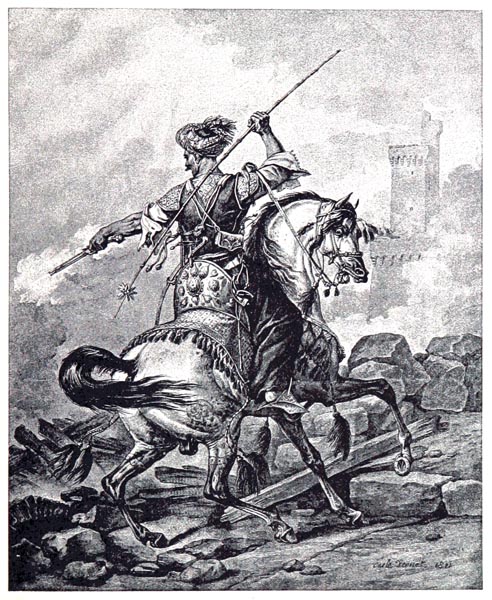
‘Mameluck au Combat, d'Après un Dessin de Carie Vernet, Gravé par Jazet’
Napoléon Ier et Son Temps - Roger Peyre (p209, 1888)
The British Library
Book XIX: Chapter 16: The Syrian Campaign
BkXIX:Chap16:Sec1
In order to prevent hostilities by the Pashas of Syria and pursue the Mamelukes, on the 22nd of February 1799 Bonaparte entered that region of the world which the action at Aboukir had bequeathed to him. Napoleon was deceived; it was merely one of his dreams of power he was pursuing. Happier than Cambyses, he crossed the desert without encountering the southerly wind; he camped among tombs; he assaulted El-Arish, and triumphed in Gaza: ‘We reached,’ he wrote on the 6th, ‘the pillars planted at the boundary of Africa and Asia; we slept that night in Asia.’ That great man marched to the conquest of the world; he was a conqueror of climates which were not to be conquered.
Jaffa was taken. After the assault, a portion of the garrison estimated by Bonaparte at twelve hundred men and taken by others to be two or three thousand, surrendered and were shown mercy: two days later, Bonaparte ordered their execution.
Walter Scott and Sir Robert Wilson have told of these massacres; Bonaparte, at Elba and St Helena, found no difficulty in admitting them to Lord Ebrington, and the doctor O’Meara. But he rejected their odium because of the position in which he found himself: he could not feed the prisoners; he could not send them back to Egypt unguarded. Allow them their liberty on parole? They would not even have comprehended such a point of honour and such European procedures. ‘Wellington, in my place,’ he said, ‘would have acted as I did.’
‘Napoleon decided,’ says Monsieur Thiers, ‘on a terrible measure which is the only cruel action of his life; he had the remaining prisoners put to death at the blade of the sword; the army carried out, with obedience but with a species of terror, the execution he had commanded.’
The only cruel action of his life, that is a fine assertion after the massacres at Toulon, after all Napoleon’s campaigns that treated human life as of no account. It is a glorious thing for France that our soldiers protested, by a species of terror, against their general’s cruelty.
But did the massacres at Jaffa save our army? Had Bonaparte not seen how easily a handful of Frenchmen had overthrown the forces of the Pasha of Damascus? At Aboukir, had he not destroyed thirteen thousand Ottomans with a few cavalry? Had not Kléber, later, made a Grand Vizir and his myriads of Mahometans vanish? If he was acting rightly, what right did the French have to invade Egypt? Why did he cut the throats of men who were only employing the right of self-defence? Finally, Bonaparte could not invoke the rules of war, because the prisoners of the Jaffa garrison had laid down their arms and their surrender had been accepted. The event which the conqueror tried hard to justify embarrassed him; that event is passed over in silence or indicated vaguely in the official despatches and the reminiscences of men attached to Bonaparte. ‘I will avoid,’ says Doctor Larrey, ‘speaking about the horrible aftermath entailed in an assault: I was the sad witness of that at Jaffa.’ Bourrienne wrote: ‘That atrocious scene still makes me shudder when I think of it, as on the day I saw it, and I would prefer to forget it than be forced to describe it. Everything one could imagine of a day steeped in blood would still fall short of the reality.’ Bonaparte wrote to the Directory that; ‘Jaffa was delivered over to pillage and all the horrors of war which had never seemed so hideous to me.’ Those horrors, who commanded them?
On the 5th of May 1809, Berthier, companion to Napoleon in Egypt, being head-quartered at Enns, in Austria, addressed a forceful despatch to the major general of the Austrian army, violently opposing a claimed shooting incident in the Tyrol, where Chasteler commanded: ‘He has allowed the destruction (Chasteler) of seven hundred French prisoners and eighteen or nineteen hundred Bavarians; a crime unheard-of in the history of nations, which would have deserved a terrible reprisal if His Majesty had not considered the prisoners as protected by his faith and honour.’
Bonaparte says here all that can be said against the execution of the prisoners at Jaffa. What did such contradictions matter to him? He knew the truth and made light of it; he treated it as if it were a lie; he only had regard for the end, the means were all the same to him; the number of prisoners was an embarrassment, he killed them.
There were always two Bonapartes: one great, the other little. When you think to enter Napoleon’s life in safety, he renders that life appalling.
Miot, in the first edition of his Memoirs (1804) is silent about the massacre; one only finds it in the 1814 edition. Copies of that edition are scarce; I had difficulty finding one. To confirm a truth so tragic, I never accept less than an eye-witness’s report. One can know about the existence of something superficially, or one can comprehend its specifics: the moral truth of an event is only revealed in the details of that event; here they are according to Miot:
‘On the afternoon of the 20th Ventôse (10th of March, 1799), the Jaffa prisoners were marched into the centre of a vast square of soldiers formed by General Bon’s troops. A rumour of the fate being prepared for them made me determine, like many others, to mount my horse and follow that silent column of victims, to ascertain whether what I had been told had any foundation. The Turks, marching out of step, foresaw their fate; there were no tears; there were no cries; they were resigned. Some of the wounded, being unable to follow quickly enough, were executed at bayonet point. Others circulated in the crowd, and seemed to be giving advice helpful in the light of such imminent danger. Perhaps they hoped that by scattering over the area they were crossing, a certain number might evade death. All due measures had been taken in that regard, and the Turks made no attempt to escape.
Arriving eventually at the sand-dunes to the south-west of Jaffa, they were halted by a pool of yellowish water. There the officer commanding the troops divided the mass of men into several sections, and these groups, led to several different places, were shot. This terrible action required a great deal of time, despite the number of soldiers, reserved for the fatal sacrifice, and who, I must declare, only lent themselves with extreme repugnance to the abominable task demanded of their victorious weapons. Near to the pool of water one group of prisoners, among whom were several older leaders of calm and noble appearance, and a young man whose resolve was weak. At so tender an age, he believed himself innocent, and that feeling drove him to an act that seemed to shock those around him. He threw himself at the legs of the horse carrying the leader of the French troops; he clasped that officer’s knee, and implored his mercy. He shouted; ‘What am I guilty of? What wrong have I done?’ The tears he wept, his touching cries, were in vain; he could not alter the fatal order that determined his doom. With the exception of this young man, all the other Turks calmly washed themselves in the stagnant water of which I have spoken, then, taking each other’s hand, after carrying it to the heart and the mouth, as the Muslim greeting goes, they gave and received an eternal farewell. Their courageous hearts appeared to defy death; in their tranquillity one saw the confidence that their religion inspired in them, in those last moments, and their hope of a joyful afterlife. They seemed to say; ‘I leave this world to go and enjoy closeness to Mahomet in a lasting happiness.’ Thus that well-being after death, that the Koran promises him, sustains the Muslim, conquered but proud in his misfortune.
I saw a respectable old man, whose taste and manners proclaimed his superior status, I saw him coolly dig a hole in the shifting sand before him, deep enough to bury himself alive: doubtless he did not wish to die except by his own hands. He lay down on his back in this sure and mournful tomb, and his friends, calling on God in suppliant prayer, covered him completely with sand, and then stamped on the dust which served him as a shroud, probably with the aim of hastening the duration of his suffering.
This scene, which made my heart thud, and which I have only feebly depicted, took place during the execution of the groups distributed among the dunes. At last, of all those prisoners, the only ones left were those standing near the pool of water. Our soldiers had exhausted their cartridges; they had to finish off the prisoners with bayonets and knives. I could not stand the dreadful sight; I fled, pale and ready to faint. The officers told me that night that those unfortunates, yielding to that irresistible natural urge to avoid death, even when they no longer hoped to escape it, flung themselves on top of one another, and received in their limbs the blows directed at their hearts which would have instantly ended their lives. They made, since it must be said, a dreadful pyramid, of dead and dying pouring out blood, and it was necessary to drag away the corpses of those already expired in order to reach the wretches who, sheltered by this awful, appalling rampart, had not yet been stabbed. The depiction is exact and faithful, and the memory makes my hand tremble which cannot describe the totality of the horror.’
The part of Napoleon’s life which contrasts with such pages explains the remoteness one feels from him.
Guided by the monks from the monastery of Jaffa to the sands south-west of the town, I made a tour of the burial site, once heaped with corpses, today a pyramid of remains; I walked among pomegranate trees burdened with ruby red fruit, while round me the first swallows, arrived from Europe, skimmed that fatal ground.
Heaven punishes violations of human rights: it sends the plague; it does not wreak total havoc in one go. Bourrienne criticises the error of historians who place the scene depicted in The Plague-Victims of Jaffa during the first French entry to that town; it only took place after the return from Saint-Jean d’Acre. Several army officers have previously assured me that the scene was pure fiction; Bourrienne confirms this information:
‘The beds of the plague-stricken,’ Napoleon’s secretary informs us, ‘were on the right on entering the first room. I walked beside the general; I confirm that I did not see him touch any of the plague-victims. He traversed the rooms rapidly, lightly tapping the yellow flap of his boot with the riding crop he held in his hand. While walking with long strides he uttered these words: “I must return to Egypt to save her from the enemy who will soon arrive.”’
In the major-general’s official report of the 29th of May, not a word is said about plague-victims, the visit to the hospital, or the touching of plague-sufferers.
What becomes of Gros’ fine painting? It remains a masterpiece of art.
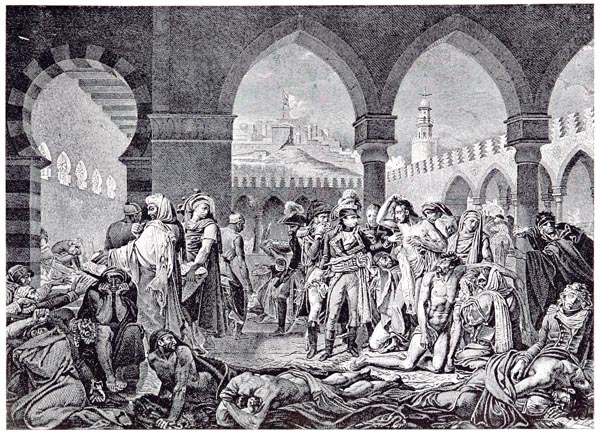
‘Bonaparte Visitant les Pestiférés de Jaffa. Tableau de Gros. Musée du Louvre’
Napoléon Ier et Son Temps - Roger Peyre (p233, 1888)
The British Library
Saint Louis, less favoured by painters, was more heroic in action: ‘The good king, gentle and debonair, when he saw this, felt great pity in his heart, and set all other things aside for now, and had ditches dug in the fields and dedicated a cemetery there on behalf of the legate.the king helped inter the dead with his own hands. There was scarcely anyone who would give a helping hand. The king came, every morning of the five days it took to inter the dead, after mass, to the place, and said to his people: “Let us go and bury the martyrs who have suffered for Our Lord, and not weary of doing so, for they have suffered more than we have.” There, were present, in ceremonial habits, the Archbishop of Tyre and the Bishop of Damietta and their clergy who performed the service for the dead. But they held their noses because of the stench; though good King Louis was not seen by anyone to hold his nose, so steadfastly and devotedly did he act.’
BkXIX:Chap16:Sec2
Bonaparte laid siege to Saint-Jean-d’Acre. Blood was shed at Cana, which witnessed the healing of the nobleman’s son by Christ; at Nazareth, which saw the Saviour’s peaceful childhood; at Thabor, which saw the transfiguration and where Peter said: ‘Lord, it is good for us to be here: if thou wilt, let us make here three tabernacles.’ It was from Mount Thabor that the order of day was dispatched to all the troops occupying Sour (the ancient Tyre), Caeserea, the Cataracts of the Nile, the Delta mouths, Alexandria and the shores of the Red Sea, which bear the ruins of Kolsum and Arsinoe. Bonaparte was charmed with these names which he delighted in placing together.
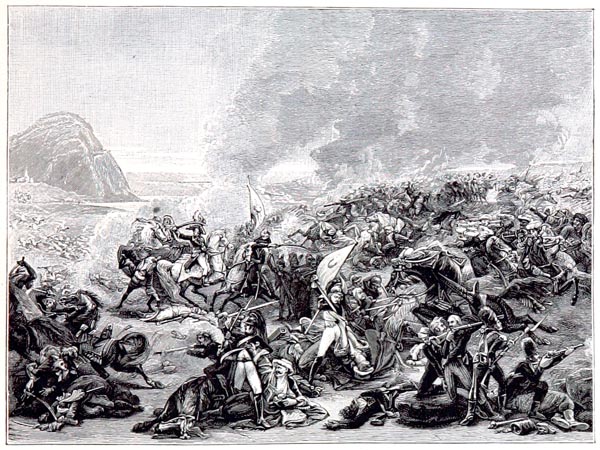
‘Combat de Nazareth. Esquisse de Gros, Musée de Nantes’
Napoléon Ier et Son Temps - Roger Peyre (p229, 1888)
The British Library
In this country of miracles, Kléber and Murat renewed the feats of arms performed by Tancred and Rinaldo; they scattered the population of Syria, seized the Pasha of Damascus’ camp, saw the Jordan, and the Sea of Galilee, and took possession of Scafet, ancient Bethulia. – Bonaparte remarked that the inhabitants pointed out the place where Judith killed Holofernes.
The Arab children of the mountains of Judea taught me the surest of traditions when they shouted in French to me: ‘Forward march!’ ‘These same deserts, ‘as I say in Les Martyrs, ‘have seen the armies of Sesostris, Cambyses, Alexander and Caesar march by: centuries to come, you will send here armies no less numerous, warriors no less celebrated!’
After tracking the still recent footsteps of Bonaparte in the East, I returned when there was nothing more to be seen of his route. Saint-Jean was defended by Djezzar the Butcher. Bonaparte wrote to him from Jaffa on the 9th of March 1799: ‘Since my entry into Egypt, I have made known to you on various occasions that my intention was not to make war on you, and that my sole aim was to pursue the Mamelukes. I will be marching in a few days time to Saint-Jean-d’Acre. But, what reason do I have to waste years of my life on an old man I do not know? What are a few leagues more given the countries I have conquered?’
Djezzar was unmoved by these attentions: the old tiger defied the claws of his young adversary. He was surrounded by servants mutilated by his own hands. ‘They say Djezzar is a cruel Bosnian,’ he said of himself (narrative of General Sébastiani) ‘a person of no account; but I need no one to wait on me and they seek me out. I was born poor; my father left me nothing but his courage. I have risen by hard labour; but that does not make me proud: since all things come to an end, today perhaps, or tomorrow, Djezzar will come to an end, not because he is old, as his enemies declare, but because God wills it so. The King of France, who was powerful, is no more; Nebuchadnezzar was killed by a gnat, etc.’
At the end of sixty-one days of digging, Napoleon was forced to lift the siege of Saint-Jean d’Acre. Our soldiers, leaving their mud huts, ran after the enemy canon balls that our canons were returning to them. Our troops, forced to defend themselves from the town and the English ships at anchor, delivered nine assaults and scaled the ramparts on five occasions. At the time of the Crusades, there was, according to Rigord, a tower at Saint-Jean-d’Acre called the accursed. This tower had been replaced perhaps by the large tower which caused Bonaparte’s attack to fail. Our soldiers leapt down into the streets, where they fought hand to hand throughout the night. General Lannes was wounded in the head, Colbert in the legs: among the dead were Rambaut, Venoux and General Bon, who carried out the massacre of the prisoners at Jaffa. Kléber said of this siege: ‘The Turks defended themselves like Christians, the French attacked like Turks’: a criticism made by a soldier who had no love for Napoleon. Bonaparte left proclaiming that he had razed Djezzar’s palace and bombarded the town until not a stone was left standing, that Djezzar had retreated with his men to one of the coastal forts, that he was grievously wounded, and that the frigates had, on Napoleon’s orders, seized thirty Syrian boats full of troops.
Sir Sydney Smith and Phelippeaux, an émigré artillery officer, assisted Djezzar: the former had been a prisoner in the Temple, the latter a companion of Napoleon’s studies.
Long ago the flower of chivalry, under Philippe-Auguste had perished before Saint-Jean-d’Acre. My compatriot, Guillaume le Breton, tells us so in twelfth-century Latin verse: ‘Throughout the kingdom one could scarcely find a place in which someone did not have a reason for tears; so great was the disaster that sent our heroes to the grave, when they were struck down by death in the town of Ascalon (Saint-Jean-d’Acre).’
Bonaparte was a great magician, but he lacked the power to transform General Bon, killed at Ptolemais, into Raoul, Sire de Coucy, who, expiring at the foot of the ramparts of that town, wrote to La Dame de Fayel: ‘Dead through loyally loving his lover.’
Napoleon could not have easily ignored the song of the canteors, he who was nourished on Saint-Jean-d’Acre as well as other tales. In the last days of his life, under a sky that is not ours, he was pleased to divulge what he intended in Syria, if that is he was not inventing plans after the fact, and amusing himself by building a fabulous future he wished us to believe in, on a past reality. ‘Master of Ptolemais,’ we recount those revelations of St Helena, ‘Napoleon founded an Empire in the East, and France was left to her fate. He flew to Damascus, Aleppo, and the Euphrates. The Syrian Christians, even those of Armenia, would have flocked to him. The nations were weakened. The remnants of the Mamelukes, the Desert Arabs of Egypt, the Druze of Lebanon, the Mutualis or oppressed Mahometans of the sect of Ali, were able to join the army which was master of Syria, and the tremor communicated itself to all Arabia. The provinces of the Ottoman Empire that spoke Arabic hailed the great change and waited on a man of happy destiny; he could be found on the Euphrates, in mid-summer, with a hundred thousand auxiliaries and a reserve of twenty-five thousand Frenchmen whom he had transferred successively from Egypt. He would have reached Constantinople and India and changed the face of the world.’
Before retreating from Saint-Jean-d’Acre, the French army touched at Tyre: abandoned by Solomon’s fleets and the Macedonian phalanxes, Tyre guarded only the imperturbable solitude of Isaiah; a solitude in which the dumb dogs refuse to bark.
The siege of Saint-Jean-d’Acre was raised on the 20th of May 1799. Arriving in Jaffa on the 27th, Bonaparte was forced to continue his retreat. There were about thirty or forty plague-sufferers, a number which Napoleon belittled to seven, who could not be moved; not wishing to leave them behind him, for fear, he said, of exposing them to the cruelty of the Turks, he proposed that Desgenettes administer a strong dose of opium to them. Desgenettes gave his well-known reply: ‘My trade is to heal men, not kill them.’ ‘No one administered opium to them,’ says Monsieur Thiers, ‘and his comment has merely served to propagate an unworthy calumny which is today discredited.’
Is it a calumny? Is it discredited? That is something I am unable to affirm in as peremptory a manner as the brilliant historian; his reasoning amounts to this: that Bonaparte did not poison the plague-sufferers because he only proposed to poison them.
Desgenettes, from a humble family of Breton gentlemen, is still held in veneration by the Syrian Arabs, and Wilson says that his name ought to be written solely in letters of gold.
Bourrienne wrote ten whole pages maintaining the poisoning occurred against those who denied it: ‘I cannot say that I saw the dose being given,’ he says, ‘I would be lying; but I am quite positive that the decision was made, and must have been made after deliberation, that the order was issued and that the plague-victims are dead. How should something which the headquarters staff regarded, from the moment of our departure from Jaffa the following day, as a certain fact, which we spoke of as an appalling misfortune, have become an atrocity invented to do harm to a hero’s reputation?’
BkXIX:Chap16:Sec3
Napoleon never erased a single one of his faults; like a tender father, he preferred those of his children who were ugliest. The French army was less indulgent than the admiring historians; it largely believed the poisoning, not merely of a few sick men, but of several hundred. Robert Wilson, in his History of the English Expedition to Egypt, was first to advance the more serious allegation; he affirmed that it relied on the views of French officers who were prisoners of the English in Syria. Bonaparte gave the lie to Wilson, who replied that he had merely told the truth. Wilson is that same Major-General seconded by Great Britain to the Russian Army during the retreat from Moscow; he has since had the good fortune to contribute to Monsieur de Lavalette’s escape. He raised a Legion opposing the legitimacy during the Spanish War of 1823, defended Bilbao and returned Monsieur Desbassyns, who had been forced to anchor in the port, to his brother-in-law, Monsieur de Villèle. Robert Wilson’s version then from various points of view carries great weight. The majority of accounts are agreed concerning the fact of the poisoning. Monsieur de Las Cases admits that the rumour of poisoning was believed by the Army. Bonaparte, who became more truthful in captivity, told Mr Warden and the doctor O’Meara that, in the state the plague-sufferers enjoyed, he would himself have found in opium a release from his pain, and that he would have administered the drug to his own son. Walter Scott recounts all that has been churned out on this subject; but he rejects the version that swells the numbers of condemned patients, maintaining that such a mass poisoning could not have been executed successfully; he adds that Sir Robert met the seven Frenchmen mentioned by Bonaparte in the hospital at Jaffa. Walter Scott maintains the greatest impartiality; he defends Napoleon as he would have defended Alexander from the accusations with which his memory has been charged.
The retreat beneath the Syrian sun was marked by a wretchedness that recalls the miseries of our soldiers during the retreat from Moscow in the depths of frost: Miot says ‘In the huts on the sea shore there were still some unfortunates waiting for transport. One soldier among them was attacked by plague, and, in the delirium that sometimes accompanies its agonising symptoms, he believed doubtless, seeing the army marching to the sound of the drum, that he was about to be abandoned; his imagination conjured up the extent of his misery if he should fall into the hands of the Arabs. One assumes that it was this fear that agitated him so greatly and suggested to him the idea of following the troops: he took up his haversack, on which his head had been lying, and placing it on his shoulders made the effort to rise. The poison of the dreadful epidemic which coursed through his veins robbed him of strength, and after a few steps he fell back face upwards on the sand. This tumble increased his terror, and, having spent a while, with wandering eyes, watching the column of marching troops, he rose a second time no more successfully; at his third attempt he succumbed, and falling nearer the sea, remained where fate had chosen the site for his grave. This soldier’s gaze was horrific; the chaos of his babbling speech, his grief-stricken face, his eyes open and staring, his tattered clothes, revealed all that is most hideous of death. His eyes fixed on the marching troops, he had lacked the sense, simple for someone calm, to turn his head to the side: he had seen Kléber’s division and that of the cavalry which were leaving Tantura after the others, and the hope of being saved might perhaps have prolonged his life.’
When our soldiers, who had remained impassive, saw one of their unfortunate comrades following them like a drunken man, stumbling, falling, rising again, and then falling forever, they said; ‘He has gone into quarters.’
A single page from Bourrienne will realise the scene:
‘A devouring thirst,’ the Memoirs state, ‘the total lack of water, excessive heat, and the wearisome march through burning sands demoralised the men, and caused the cruellest selfishness, the most grievous indifference, to defeat every generous feeling. I saw the stretchers reserved for amputee officers, organised by the transport officers, who had even been paid money in recompense for their efforts, thrown aside. I saw the amputees themselves, the wounded, the plague-stricken, or those only suspected of being so, abandoned amongst the crops. The march was illuminated by torches lit in order to burn the little towns, markets, villages, hamlets, and rich harvest with which the earth was covered. The countryside was all ablaze. Those who been ordered to preside over these disasters seemed, by extending desolation everywhere, to seek revenge for their setbacks and to find solace for their suffering. We were surrounded only by the dying, by looters and by incendiaries. The dying, abandoned by the edge of the track cried in feeble voices; ‘I am not plague-stricken, I am only wounded; and, in order to convince the passers-by, one saw them tear open their wounds or make fresh ones. No one believed them; they said: He’s done for; they passed by, wavered a moment, then all was forgotten. The sun, in all his glory in that beauteous sky, was obscured by the smoke from our continual incendiaries. We had the sea on our right; on our left and behind us was the desert we were creating; in front the privation and suffering that awaited us.’
Book XIX: Chapter 17: Return to Egypt – The Conquest of Upper Egypt
BkXIX:Chap17:Sec1
‘He left; he has arrived; he has scattered the storms; his return has made them vanish into the desert.’ So sang the conqueror repulsed, in his own praise, on re-entering Cairo: he carried the world with hymns.
During his absence, Desaix had achieved Upper Egypt’s surrender. In ascending the Nile one encounters ruins to which the language of Bossuet concedes all their grandeur and augments it. ‘They discovered,’ says the author of the Universal History,’at Saïd, temples and palaces almost completely untouched, with innumerable columns and statues. There they particularly admired a palace whose remains seem only to have survived to efface the glory of all the greatest works. Four avenues, stretching as far as the eye can see, and bordered on either side by sphinxes of a material as rare as their grandeur is remarkable, serve to arrive at four porticoes whose height astonishes the eye. What a magnificent expanse! Those who described this prodigious edifice for us have still not had long enough to make a complete tour of it, and are not even certain of having seen the larger part of it; but all those who have seen it are astonished. One room, which apparently constituted the centre of this superb palace, was supported on six and twenty columns of six arm-lengths around, tall in proportion, and intermingled with obelisks that the many centuries have not been able to fell. Even the colours, that is to say those things which soonest reveal the power of time, still survive among the ruins of that admirable edifice, and retain their vivacity: Egypt knew how to give such immortal character to all her works! Now that the name of King Louis XIV penetrates to the least known regions of the world, would it not be a worthy object of his noble curiosity to discover the beauties that the Thebaid conceals in its deserts? What beauties might one not find if one could reach the royal city, given one can discover such marvellous things so far from it! The Roman Empire, despairing of equalling the Egyptians, thought it enough for its grandeur to borrow their royal monuments.’
Napoleon charged himself with executing the advice Bossuet gave Louis XIV. ‘Thebes,’ says Monsieur Denon, who accompanied Desaix’s expedition, ‘that abandoned city which the imagination only glimpses through the mists of time, was nevertheless so gigantic a phantom that the soldiers halted on seeing it, of their own accord, and clapped their hands. Amongst the obliging enthusiasm of the soldiers, I found knees to serve me for a table, and bodies to give me shade. At the cataracts of the Nile, our soldiers, continually fighting the beys and undergoing incredible hardships, amused themselves, by establishing in the village of Syene fixed price tailor’s shops, goldsmiths, barbers, and caterers. Beneath a regimented alley of trees, they set up a military column with the inscription: Road to Paris. Descending the Nile once more, the army often had dealings with the Meccans. The Arab entrenchments were set on fire: they lacked water; they beat out the fire with their feet and hands; they stifled it with their bodies. They were seen, black and naked, running through the flames: a likeness of devils in Hell. I never saw it without a feeling of horror and admiration. There were moments of silence in which some voice could be heard; it was responded to by sacred chants and battle cries.’
Those Arabs sang and danced like the Spanish soldiers and monks set alight at Saragossa; while the Russians burned Moscow; the kind of sublime madness that agitated Bonaparte, he communicated to his victims.
Book XIX: Chapter 18: The Battle of Aboukir – Napoleon’s notes and letters – He returns to France – The 18th Brumaire
BkXIX:Chap18:Sec1
Napoleon back at Cairo wrote to General Dugua: ‘Citizen Governor you must cut off Abdalla-Aga’s head, that former Governor of Jaffa, held in the citadel. From what I am told he is a monster from whom the earth must be delivered. You must shoot the following, Hassan, Joussef, Ibrahim, Saleh, Mahamet, Bekir, Hadj-Saleh, Mustapha, Mahamed, all Mamelukes.’ He often repeated his orders against Egyptians who had spoken badly of the French: such was the situation that Bonaparte enacted a law; did even the rights of warfare allow him to sacrifice so many lives on the simple order given by a commander: you must shoot them? To the Sultan of Darfur he wrote: ‘I wish you to send me two thousand male slaves over sixteen years old.’ He delighted in slaves.
An Ottoman fleet of hundred vessels anchored at Aboukir and disembarked an army: Murat, supported by General Lannes, drove it into the sea; Bonaparte reported, concerning this success, to the Directory: ‘The bay whose currents last year bore the corpses of English and French is today covered with those of our enemies.’ One grows as tired of marching through these mounting victories as through the shimmering dunes of those deserts.
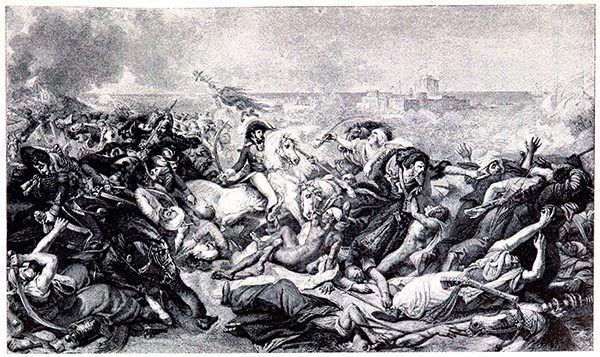
‘Bataille d'Aboukir (25 juillet 1799), Peint par Gros, Musée de Versailes’
Napoléon Ier et Son Temps - Roger Peyre (p239, 1888)
The British Library
The following note strikes the spirit mournfully: ‘I am little pleased, Citizen General, with the sum of your activities during the action which recently took place. You received the order to take yourself off to Cairo and have done nothing about it. Any amount of events which occur should never prevent a soldier obeying an order, and skill in warfare consists in simplifying those difficulties which may render an operation awkward, and not in failing to execute it.’
Ungrateful already, this rude instruction from Bonaparte was addressed to Desaix who offered, while leading his brave men through Upper Egypt, as many examples of humanity as courage, marching in his horse’s footsteps, chatting about ruins, missing his country, sparing women and children, admired by the native population who called him the Just Sultan; to that Desaix killed later at Marengo in the charge which made the First Consul the master of Europe. The character of the man shows through Napoleon’s note: dominating and jealous; it identifies the trait that afflicts all famous men, those who create destiny, those to whom is granted the word that lingers and compels; and without that power of command could Bonaparte have carried all before him?
Ready to leave the ancient lands where humanity once cried out in death: ‘You powers that dispense life to men receive me and grant me a place among the immortal gods!’ Bonaparte only considered his future on earth: he sent warnings to the Governors of the Île de France and the Île de Bourbon via the Red Sea; he sent greetings to the Sultan of Morocco and the Bey of Tripoli; he informed them of his fond concern for the caravans and pilgrims of Mecca; Napoleon at the same time sought to deter the Grand Vizier from the invasion that the Porte intended, assuring him that he was as ready to conquer all, as to enter into negotiations about all.
One thing would have brought little honour to our character, if our imaginativeness and love of novelty had not been more to blame than the loss of our national sense of fair play; the French on the Egyptian expedition felt enraptured, and did not notice that they were injuring both honesty and political justice: completely at peace with France’s oldest ally, we attacked them, stole from them their fertile Nile province, without a declaration of war, like the Algerians who, in one of their algarades, seized Marseilles and Provence. When the Porte armed itself for legitimate defence, proud of our notable pre-emption, we asked them what they were at, why they were angry; we declared that we had taken up arms in order to police the region, and drive out the brigands and Mamelukes who held their Pasha prisoner. Bonaparte informed the Grand Vizier; ‘How can Your Excellency not feel that every Frenchman killed is one more ally lost to the Porte? As for me, I will consider the finest day of my life to be that on which I may contribute to ending a war at once impolitic and pointless.’ Bonaparte wished to leave: so the war was pointless and impolitic! The former monarchy however was as guilty as the Republic: the archives of its foreign affairs contain various plans for French colonies in Egypt; Leibnitz himself had suggested an Egyptian colony to Louis XIV. Indeed the English themselves only value affirmative politics, that of self-interest; fidelity to treaties and moral scruples seem to them to be puerile.
BkXIX:Chap18:Sec2
At last the hour chimed: brought to a halt at the eastern frontiers of Asia, Bonaparte soon left to seize the European sceptre, then to seek in the north, by another road, the gateway to the Himalayas and the splendours of Kashmir. His last letter to Kléber, dated from Alexandria, on the 22nd of August 1799, is quite excellent and unites reason, experience and authority. The conclusion of the letter achieves serious and profound pathos.
‘You will find enclosed, Citizen General, an order to take command as head of the army. The fear that the English fleet may reappear at any moment has brought forward my setting sail by two or three days.
I am taking with me Generals Berthier, Andréossi, Murat, Lannes and Marmont and citizens Monge and Berthollet.
You will find enclosed the English newspapers and those from Frankfurt up to the 10th of June. You will see that we have lost Italy, and that Mantua, Turin and Tortona are under siege. I have room for hope that the first of these will hold out until the end of November. I hope, if fortune smiles on me, to arrive in Europe before the beginning of October.’
Specific instructions follow.
‘You will appreciate as well as I do how important the possession of Egypt is to France: this Turkish Empire, which threatens destruction on all sides, is now collapsing, and the evacuation of Egypt would be all the greater a misfortune, in that we would see in our day this beautiful province fall into different European hands.
The news of the successes or defeats that the Republic may experience must also enter significantly into your calculations......
Citizen General, you are aware of how I view the internal politics of Egypt: whatever you do, the Christians will be our friends. They must be prevented from being too arrogant, lest the Turks display the same fanaticism towards us that they do towards the Christians, which would render them irreconcilable to our presence................
I have already asked several times for a troupe of actors; I will take especial care to send you one. The thing is very important to the Army, and in starting to change the customs of the country.
The important position you will occupy as commander will allow you finally to deploy the talents which nature has given you. What happens here will be of great interest, and the results will be immense as far as commerce and civilisation are concerned: this will be the epoch from which the great revolutions will date.
Accustomed to view the recompense for life’s pains and efforts in the light of posterity, I am leaving Egypt with the greatest of regrets. Only the interests of our country, its glory, obedience, and the exceptional events which have happened, have decided my passage through the enemy squadrons in order to return to Europe. I will be with you in heart and spirit. Your successes will be as dear to me as those I might achieve in person, and I will regard those days as ill employed on which I do not do something for the army whose command I leave you, and so consolidate the magnificent edifice whose foundations have been laid.
The army I entrust you with is composed entirely of my children; I have had at all times, even in the worst troubles, tokens of their affection. Maintain those sentiments, and you will owe it to the esteem and quite particular friendship I have for you and the true affection I bear them.
BONAPARTE.’
No warrior has ever achieved a similar tone of voice; it is Napoleon who concludes it; the Emperor, who follows, will of a surety be more astonishing still: but how much more detestable! His voice will no longer possess the tones of youth: time, despotism, the intoxication of success, will alter it.
Bonaparte would have been deeply to be pitied if he had been forced, in accordance with the ancient Egyptian law, to clasp in his embrace for three days the children whose death he had caused. He dreamed of providing, for the soldiers whom he left exposed to the heat of the sun, those entertainments that Captain Parry employed twenty years later for his sailors in the freezing polar nights. He left his Egyptian legacy to his brave successor, who was soon to be assassinated, and slunk away furtively, as Caesar saved himself by swimming, in the port of Alexandria. That queen whom the poet called a fatal prodigy, Cleopatra, did not await Napoleon; he journeyed to the secret rendezvous assigned to him by Fate, another faithless power. After having plunged into the Orient, the source of marvellous renown, he returned to us, without however having been seen in Jerusalem, just as he never entered Rome. The Jew who cried: ‘Woe! Woe’ wandered about the holy city without penetrating the eternal tabernacle. A poet, escaping from Alexandria, was last to board the risk-bound frigate. Impregnated by the miracles of Judea, having appreciated the tomb in the Pyramids, Bonaparte crossed the sea, heedless of enemy ships and the deep: all things were fordable by this giant, whether events or waves.
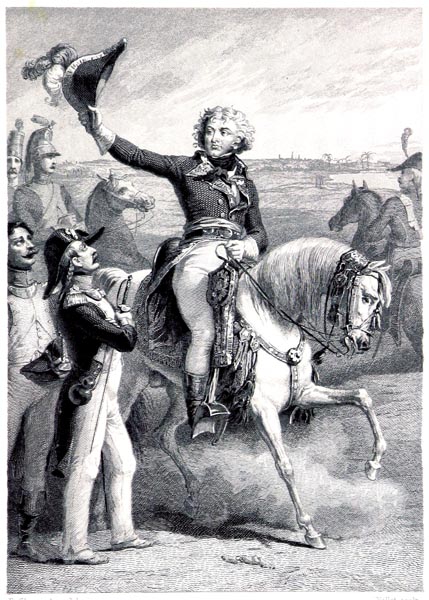
‘Portrait of General Kléber’
Histoire du Consulat et de l'Empire, Faisant suite à l'Histoire de la Révolution Française - Alexandre Dumas (p759, 1894)
Internet Archive Book Images
Napoleon takes the route I followed: he skirts Africa faced with contrary winds; at the end of twenty-one days he doubles Cape Bon; he gains the coast of Sardinia, is forced to anchor at Ajaccio, casts his eyes on his place of birth, receives some money from Cardinal Fesch, and re-embarks; he comes across the English fleet which does not pursue him. On the 8th of October, he enters the harbour of Fréjus, not far from the Gulf of Juan where he would become manifest on a second terrible occasion. He goes ashore, departs, arrives at Lyons, takes La Route Bourbonnais, and enters Paris on the 16th of October. All seem opposed to him, Barras, Sieyès, Bernadotte, Moreau; and all these opponents come to serve him as if by a miracle. The conspiracy is hatched; the government is transferred to Saint-Cloud. Bonaparte wants to harangue the Council of Elders: he is agitated, he stammers out brothers in arms, volcanoes, victory, Caesar; he is called a Cromwell, a tyrant, a hypocrite: he wishes to accuse and is accused; he says he is accompanied by the god of war and the goddess of fortune; he withdraws shouting: ‘Whoever loves me follow me!’ His arrest is demanded; Lucien, President of the Council of the Five Hundred, resigns so as not to put Napoleon beyond the law. He draws his sword and swears to pierce his brother’s breast, if he should ever attempt to strike a blow at liberty. They talk about having this deserter shot, this flouter of the medical code, this plague-carrier, and they crown him. Murat makes the representatives leap from the windows; the 18th of Brumaire is accomplished; Consular government is born, and freedom dies.
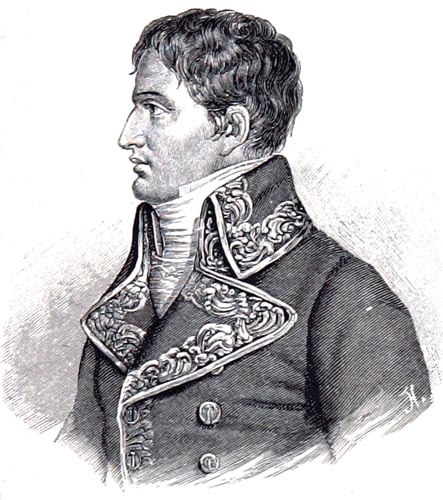
‘Lucien Bonaparte, d'Après un Document du Temps’
Napoléon Ier et Son Temps - Roger Peyre (p273, 1888)
The British Library
So absolute change is brought about in society: the man of the last century departs the stage: the man of the new century makes his entrance. Washington, at the end of his prodigious achievements, yields his place to Napoleon, who begins his. On the 9th of November the President of the Unites States closes the year 1799: the First Consul of the French Republic opens the year 1800:
‘A great destiny commences, a great destiny is completed.’
It was across these immense events that the first part of my Memoirs, that you have read, were written; just as a modern text desecrates some ancient manuscript. I told of my despondency and obscurity in London against the background of Napoleon’s brilliant rise; the sound of his footsteps mingled with the silence of mine on my solitary walks; his name pursued me into those little rooms where were to be found the sad poverty of my companions in misfortune, and the joyous distress or, as our former language would have said, the mirthful misery of Peltier. Napoleon was my age: both of us leaving the womb of the army, he won a hundred battles while I yet languished in the obscurity of the Emigration which was the pedestal of his fortune. Left so far behind him, could I ever rejoin him? Yet nonetheless while he was dictating the law to monarchs, while he was crushing their armies and making their blood spurt at his feet, while flag in hand, he crossed the bridges at Arcola and Lodi, while he triumphed at the Pyramids, would I have given for all those victories a single one of those forgotten hours spent in England in a little unknown town? Oh, the magic of youth!
End of Book XIX